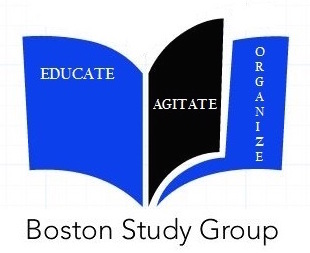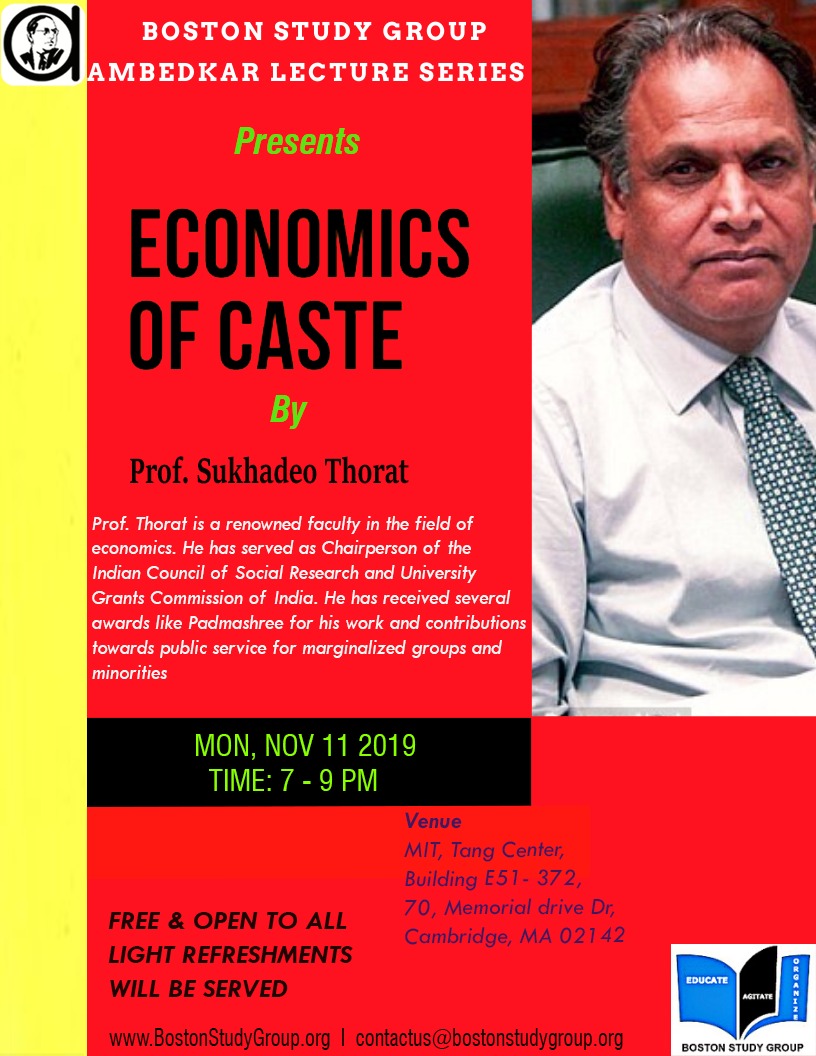
11TH NOV 2019
Ambedkar Lecture Series-28
Economics of Caste
YouTube Link Economics of Caste
Boston Study Group had its November month lecture series on topic – Economics of Caste by Prof. Sukhadeo Thorat. is a renowned faculty in the field of economics. He has served as Chairperson of the Indian Council of Social Research and University Grants Commission. He has won several awards like Padmashree for his work and authored many books on caste discrimination in economics, health and education. Prof Thorat outlined certain aspects of caste system including division of people, unequal graded assignment of rights, retaining the caste system through mechanisms of ostracization and its base in religion. Economic power through ownership of capital assets, means of production, enterprises, business services and employment is a powerful way to maintain the material base to caste system. ‘Caste is an enclosed caste’, he said quoting Dr Ambedkar. Prof Thorat described how affirmative action policies in the area of education, employment and politics for marginalized communities have helped to break this cycle of inter-generational privilege of dominant caste communities in India. ‘Although the market and non-market economic spheres have been affected by current wave of privatization’, he said. Economic empowerment can reduce the intensity of discrimination through upward mobility. Through a deeply engaging conversation, Prof Thorat interacted with the audience after the lecture on varied topics like transparency and monitoring in the system, electorate system, affirmative action in private sector and state socialism.
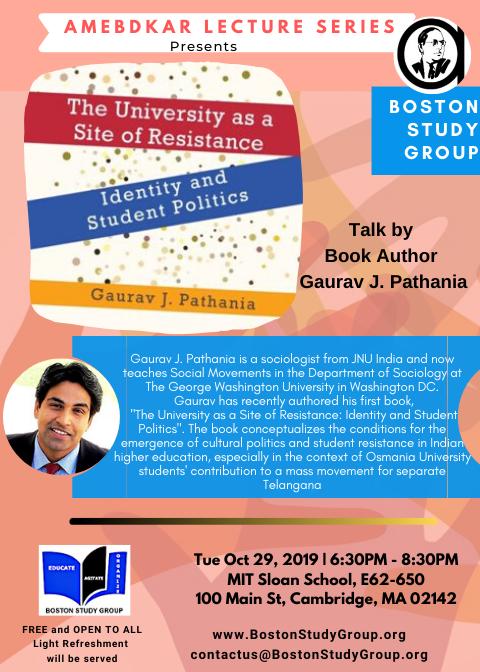
29TH OCT 2019
Ambedkar Lecture Series-27
The University as a Site of Resistance : Identify and Student Politics
YouTube Link The University as a Site of Resistance : Identify and Student Politics
Boston Study Group had its October month lecture series on a book topic -The University as a Site of Resistance : Identify and Student Politics. It was a talk by the author Dr. Gaurav J. Pathania. He is a sociologist from JNU, India and now teaches Social movements in the department of Sociology at The George Washington University in Washington, DC. His recent book, ‘The University as a site of Resistance’ conceptualizes the conditions for the emergence of cultural politics and student resistance in Indian higher education, especially in the context of Osmania University student’s contribution to a mass movement for separate Telangana state within the democracy and constitutional framework. Gaurav discussed the shift of ideology based social movement towards identity based model and the role of multiple identities and culture in it. He outlined the social movement in Telangana state in 1970’s, winning of seats, disappointment with political parties and violent revolution by the community. The revival of the social movement in Telangana was inspiring in many ways and it was heartening to hear the struggles of the community in finding their own state identity. When Telangana was finally formed on June 2, 2014, it was not only a state which was formed but a culture of the people struggling for it. Gaurav also compared and contrasted various other student movements as well as state formations in India. The discussion after the talk was also exciting with questions about identity politics, individual’s ego, statehood and ideology.
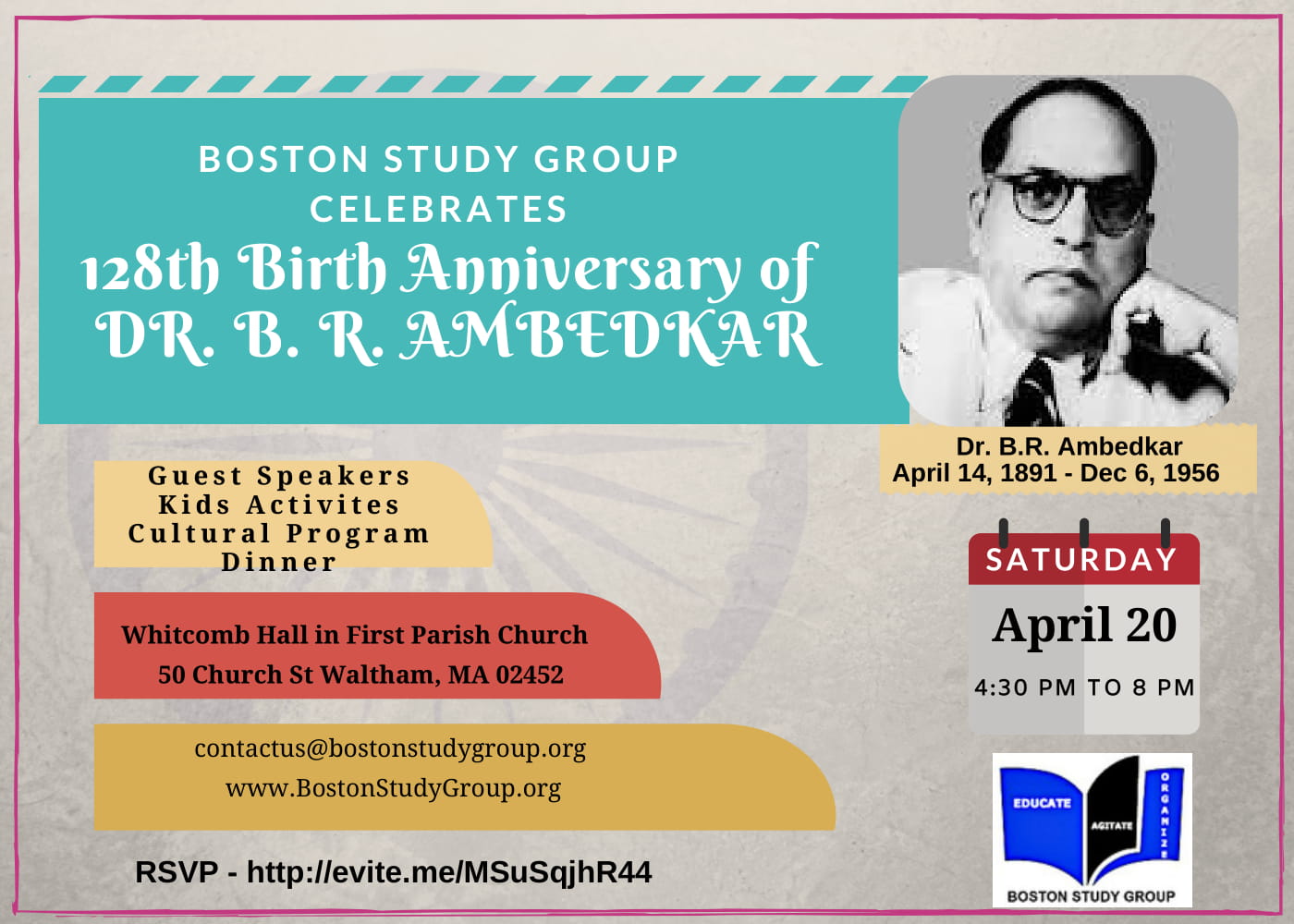
20TH APRIL 2019
128th Birth Anniversary Celebration of Dr. B. R. Ambedkar
Basasaheb Ambedkar Jayanti
Boston Study Group, an Ambedkarite organization in New England USA working towards universalizing Dr. B.R. Ambedkar’s ideology, celebrated his 128 birth anniversary. The celebration was a colorful mix of a panel discussion, speeches from various academics, songs, poetry, kid’s speeches and dances from the community representing a rich diversity of Indian diaspora and friends from other nationalities and ethnicity. A young talented pianist aged 7 enthralled everyone with his tunes. A classical singing duo performed poetry of Sant Kabir and Sant Chokha Mela who were social reformers from Bhakti movement, mesmerizing the audience. The event was multilingual in nature with various songs, poetry and speeches in Hindi, Marathi, Punjabi and English, all singing the resistance to oppression. Adorable kid’s speeches walked us through key events of Dr. Ambedkar’s life and his contribution to Indian society. The panel discussion focused on the theme of ‘Working in solidarity with Ambedkarite movement’ and reflected on Dr. Ambedkar as a universal role model rather than being limited to one community. ‘Educate, Agitate and Organize’ was highlighted in many ways during the discussion. Various guests from Canada, New York and Boston presented their views on the responsibility of Ambedkarite movement to take the caravan of anti-oppressive framework forward through non-violence and love. The hall rang with the passionate and warm ‘Jai Bhim’ throughout the evening. Jai Bhim means victory to the ideology of Dr. Ambedkar of equality, liberty and fraternity. This hold true for the event where folks from all movements came together for an evening of joyous celebration!
!!! PRESS RELEASE COMING SOON !!!
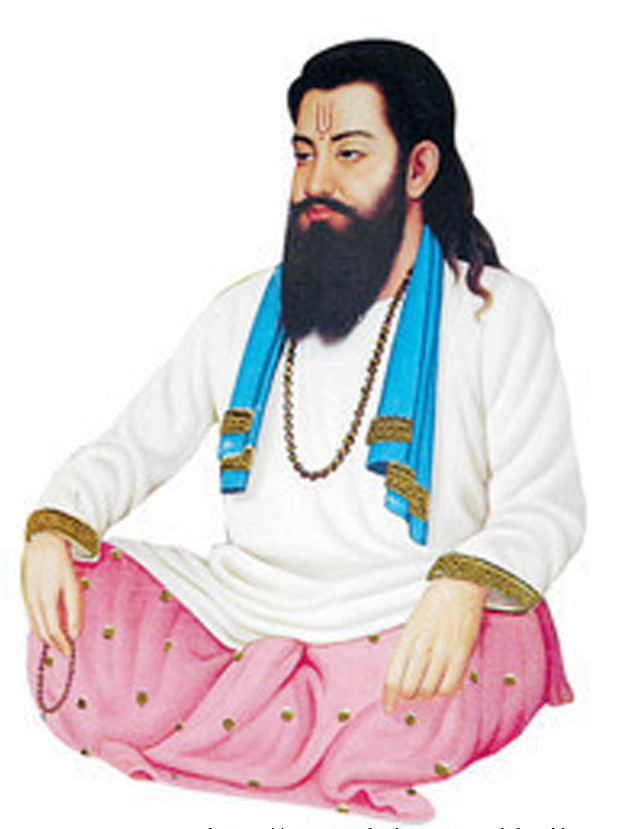
16TH MARCH 2019
642th Birth Anniversary Celebration of Guru Ravidas
Guru Ravidas Jayanti
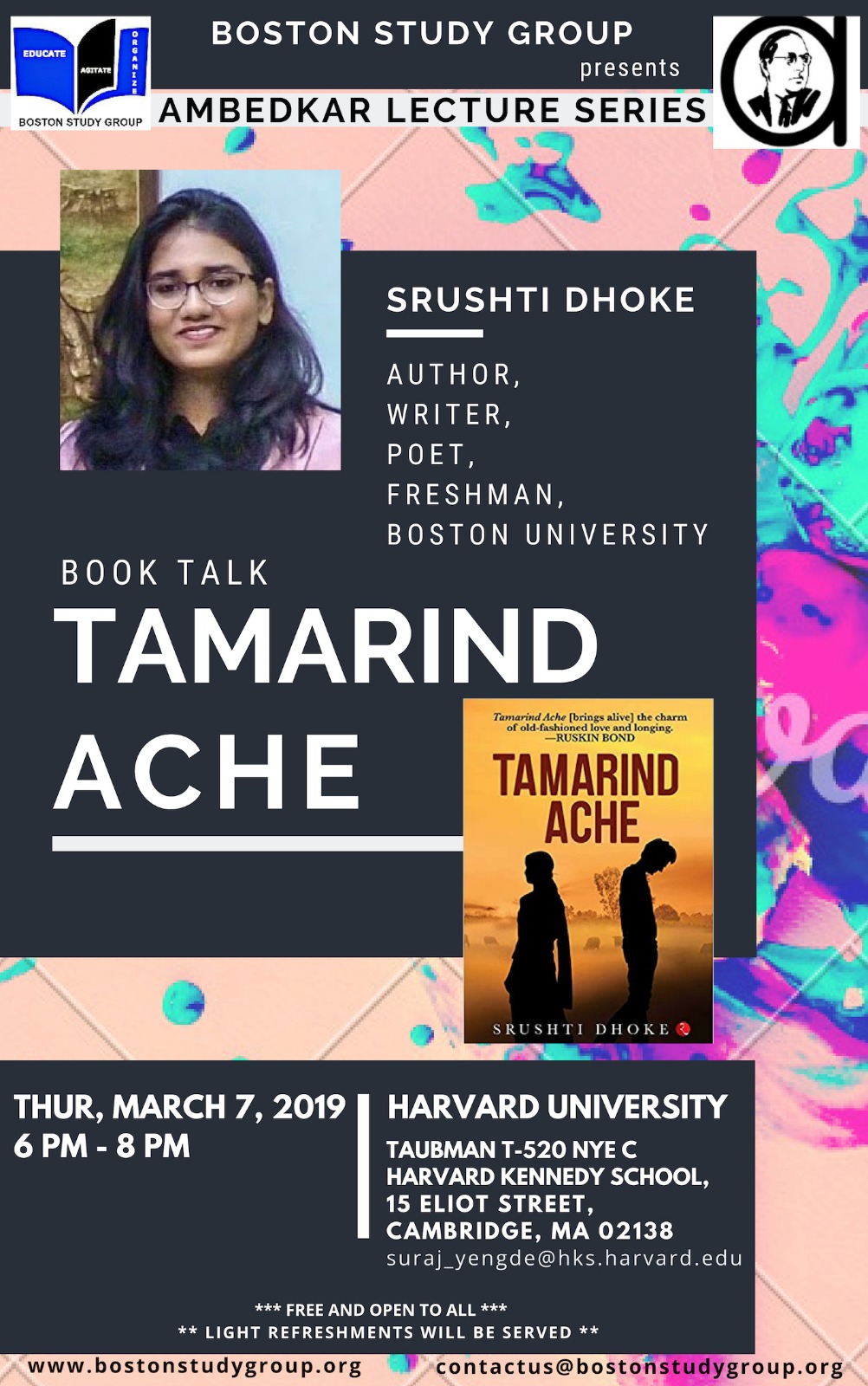
7TH MARCH 2019
Ambedkar Lecture Series-24
Book Talk – TAMARIND ACHE
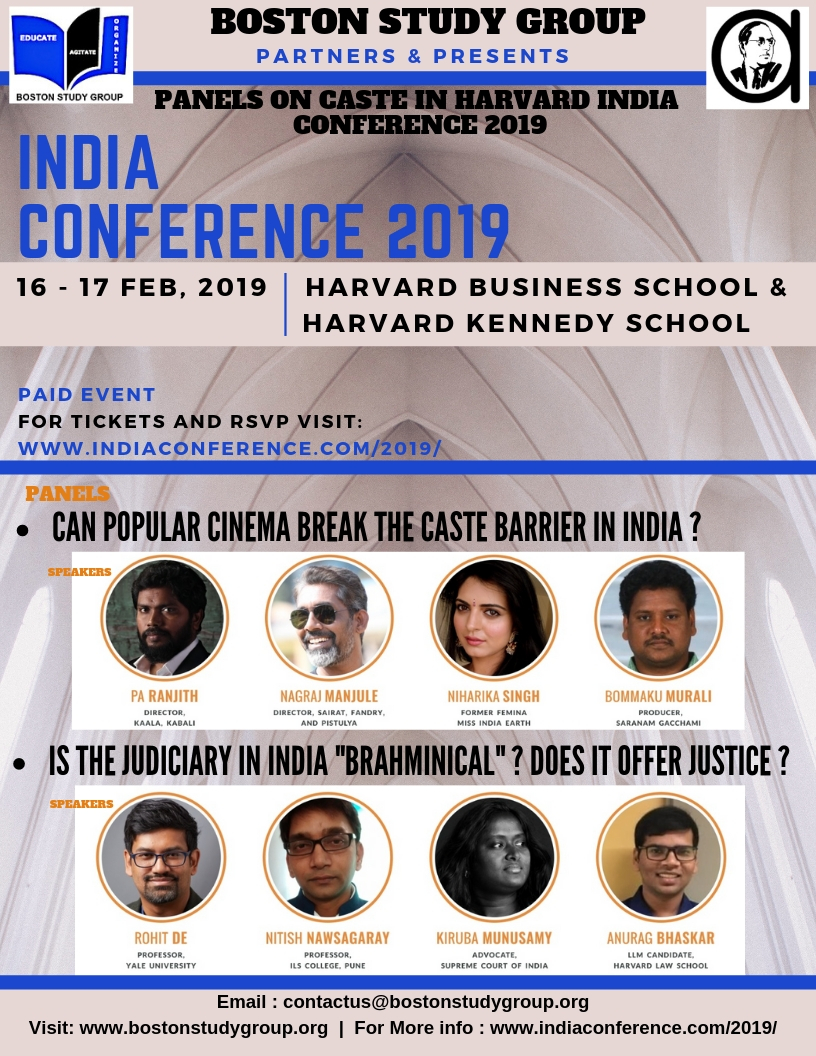
16TH-17TH FEBRUARY 2019
Harvard India Conference 2019
BSG Panels in Harvard India Conference 2019
- Panel 1: Can popular cinema break the caste barrier in India? Youtube link Panel 1
The panel on caste in popular media was very thought-provoking. With our distinguished guests Pa Ranjith (Director and Producer), Nagraj Manjule (Film-maker) and Niharika Singh (Miss India Earth 2005), there was a lively discussion about caste in Indian films and what it depicts of social life. Pa Ranjith reflected that most often Dalits are depicted as powerless and ‘not able to fight for themselves’ but he wanted to change that narrative. Coming out openly as an Ambedkarite had fearful connotations for them and they were often afraid that they would be ostracized. On this note, Nagraj Manjule reflected that they were already on the margins, where else could they be ‘thrown’ out! This further reinforced their strength in their passion for making films showcasing Dalit lives ‘in reality’ despite push backs. Niharika Singh talked about her survival as a Dalit woman in India and her struggle in the film industry. ‘People are either uneducated or miseducated’, she said. The panelists reflected that while films were playing their role in bringing a change, it was more than films that was required to change the consciousness of people. The panel generated interesting questions from the audience about depictions of different communities in films and the role of filmmakers in changing the social narratives.
- Panel 2: Is the judiciary in India Brahminical? Does it offer justice? Youtube link Panel 2
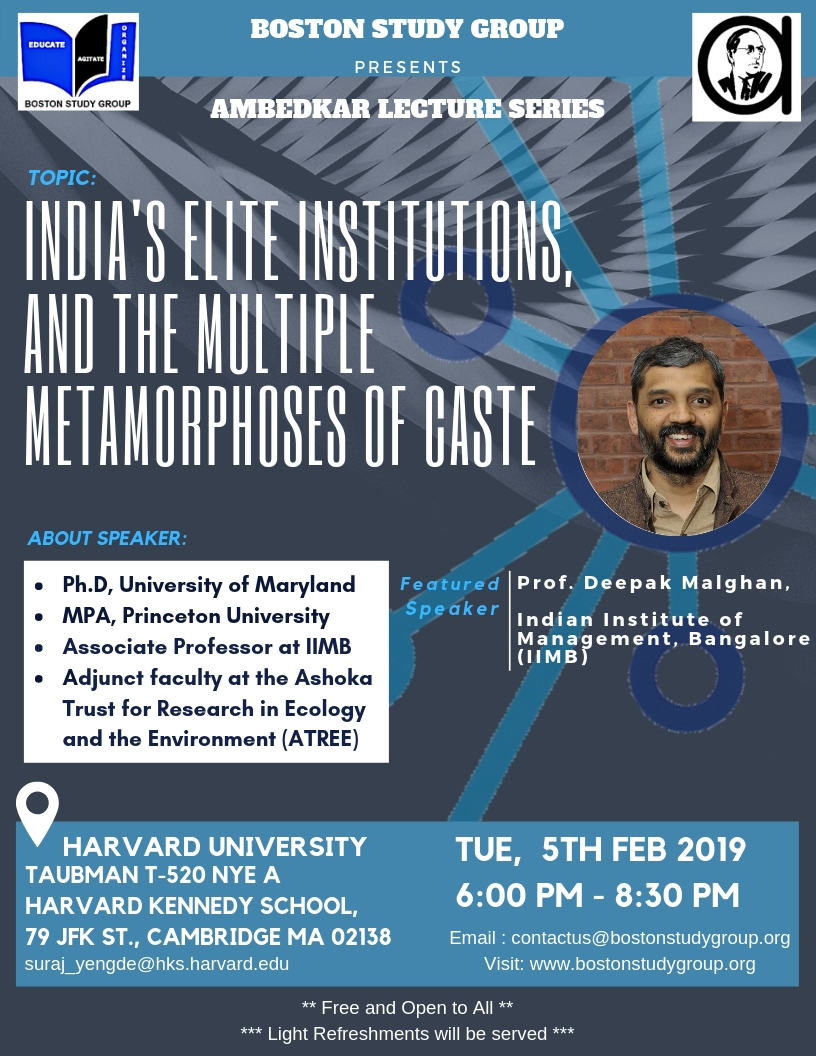
5TH FEBRUARY 2019
Ambedkar Lecture Series-23
India’s Elite Institutions and the Multiple Metamorphoses of Caste
BSG had its February month Ambedkar Lecture Series on Topic – India’s Elite Institutions and the Multiple Metamorphoses of Caste by speaker Prof. Deepak Malghan. About the speaker: Deepak Malghan is a theoretical ecological economist with primary interest in the general theory of scale. Scale measures the proportional relationship between the economy and ecosystem that contains and sustains it. Among other recognitions for his contributions to scale theory, he received the 2015 VKRV Rao Prize in Social Sciences, India’s top award for a social scientist under the age of forty-five. He is the first ecological economist and the first engineer to be recognized by a VKRV Rao Prize. His prize-winning scale theory based reformulation of ecological economics will appear as a monograph in 2019. In 2014-2015, Malghan was awarded the Fung Global Fellowship at Princeton University where he initiated a new multi-year book project to chronicle the global history of the idea of efficiency. Malghan is an associate professor at the Indian Institute of Management Bangalore (IIMB). Beyond theoretical ecological economics, his lab at IIMB has also pioneered new approaches to ethnic inequality and stratification. He is also an adjunct faculty at the Ashoka Trust for Research in Ecology and the Environment (ATREE) where he works on problems in urban hydrology. Malghan holds a Ph.D. from the University of Maryland, and an MPA from Princeton University. He also holds a trade certificate as an electrician with a specialization in alternator rewinding and renewable energy technologies.
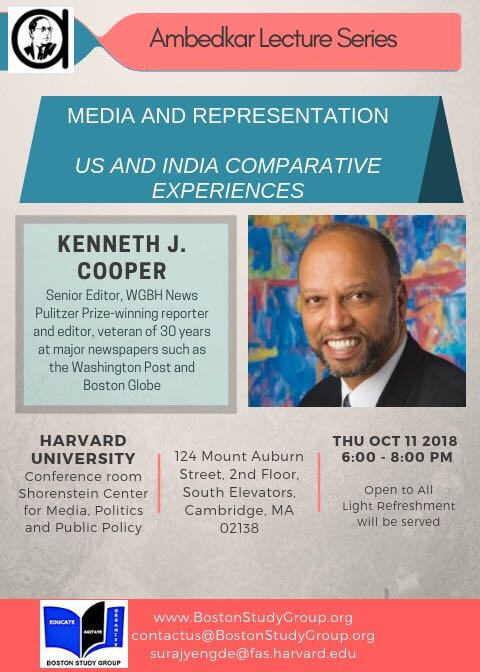
14th SEPTEMBER 2018
Ambedkar Lecture Series-22
Media and Representation: US and India comparative experiences
***Due to technical issues we haven’t done Youtube live but will upload video soon and put Youtube link****
BSG had its October month Ambedkar Lecture Series on topic – Media and Representation: US and India comparative experiences by speaker Kenneth J. Cooper. He is Pulitzer Prize-winning reporter and editor, veteran of 30 years at major newspapers such as the Washington Post and Boston Globe. Currently, an independent writer for national magazines, freelance editor and consultant on journalism projects. Exploring new interest in the Middle East and developing a major writing project, a historical narrative set in Arkansas, Kansas and Oklahoma. Specialties: National politics and government, Indian subcontinent, education, health, journalism, books.
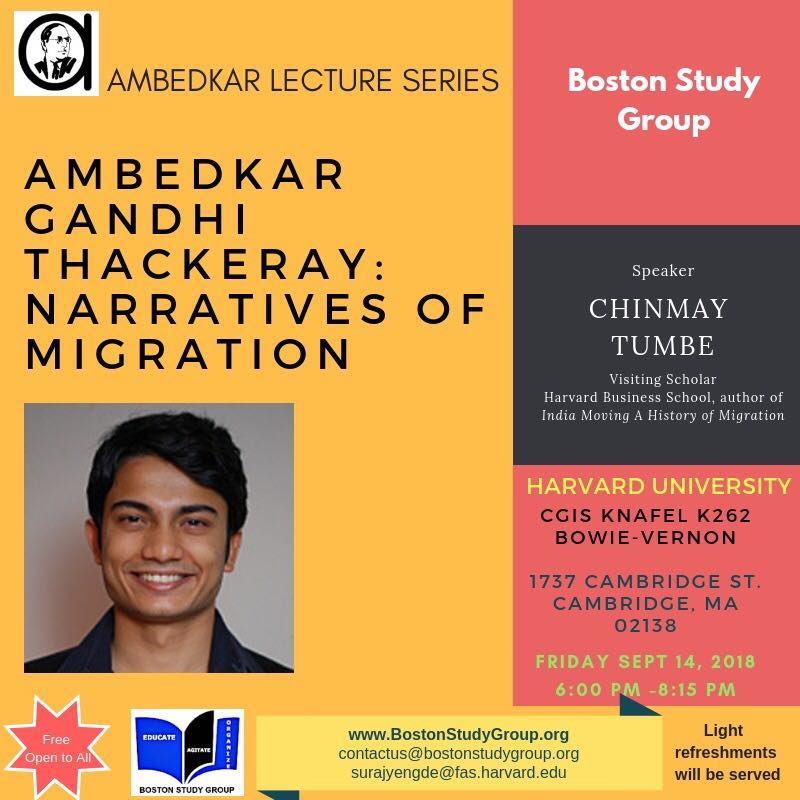
14th SEPTEMBER 2018
Ambedkar Lecture Series-21
Ambedkar, Gandhi and Thackeray : Narratives of Migration
Youtube video link ![]() Ambedkar, Gandhi and Thackeray : Narratives of Migration
Ambedkar, Gandhi and Thackeray : Narratives of Migration
BSG had its September month Ambedkar Lecture Series on Topic: Ambedkar, Gandhi and Thackeray – Narratives of Migration by speaker Chinmay Tumbe. He is an IIMA author of “India Moving: A History of Migration”. A little bit of India too moves with every migrant. From adventure to indenture, martyrs to merchants, Partition to plantation, from Kashmir to Kerala, Japan to Jamaica and beyond, India Moving is the first book to map out the great migrations that have made the country and the world a more diverse place to live in. To understand how millions of people have moved-from and to India-the book embarks on a journey laced with evidence, argument and wit, providing insights into topics like the slave trade and the migrations of workers, travelling business communities such as the Marwaris, Gujaratis and Chettiars, refugee crises like the Partition, and the roots of contemporary mass migration from Bihar and Kerala, covering a terrain that often includes seemingly unrelated topics like mangoes, dosas and pressure cookers. India Moving shows the scale and variety of Indian migrations and argues that greater mobility is a prerequisite for maintaining the country’s pluralistic traditions.
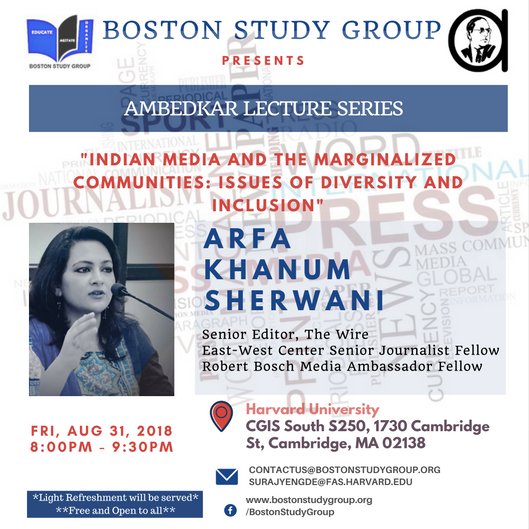
31ST AUGUST 2018
Ambedkar Lecture Series-20
Indian media and the marginalized communities : Issues of diversity and inclusion
BSG had its August month Ambedkar Lecture Series on Topic: Indian media and the marginalized communities : Issues of diversity and inclusion by speaker Ms. Arfa Khanum Sherwani. She is a senior television journalist and former anchor at Rajya Sabha TV (RSTV) where she hosted a daily analysis show called Desh Deshantar. She also worked with Aamir Khan Productions for Satyamev Jayate and NDTV. She is currently a senior editor at “The Wire”. She is also a East-West Center (EWC) senior journalist fellow and Robert Bosch Media Ambassador fellow. In the age of aggressive nationalism where our politics and media is demanding not unity but uniformity, the space for diversity within the Indian society and the issues of the communities living on the margins of Indian democracy is increasingly decreasing. The nationalism narrative is empowering the traditionally dominant social groups and is further marginalizing our poor and disadvantaged groups . As a media insider, she will discuss the above at length and also highlight the perils of exclusion of the issues and voices of the weakest of our society and its implications for Indian democracy.
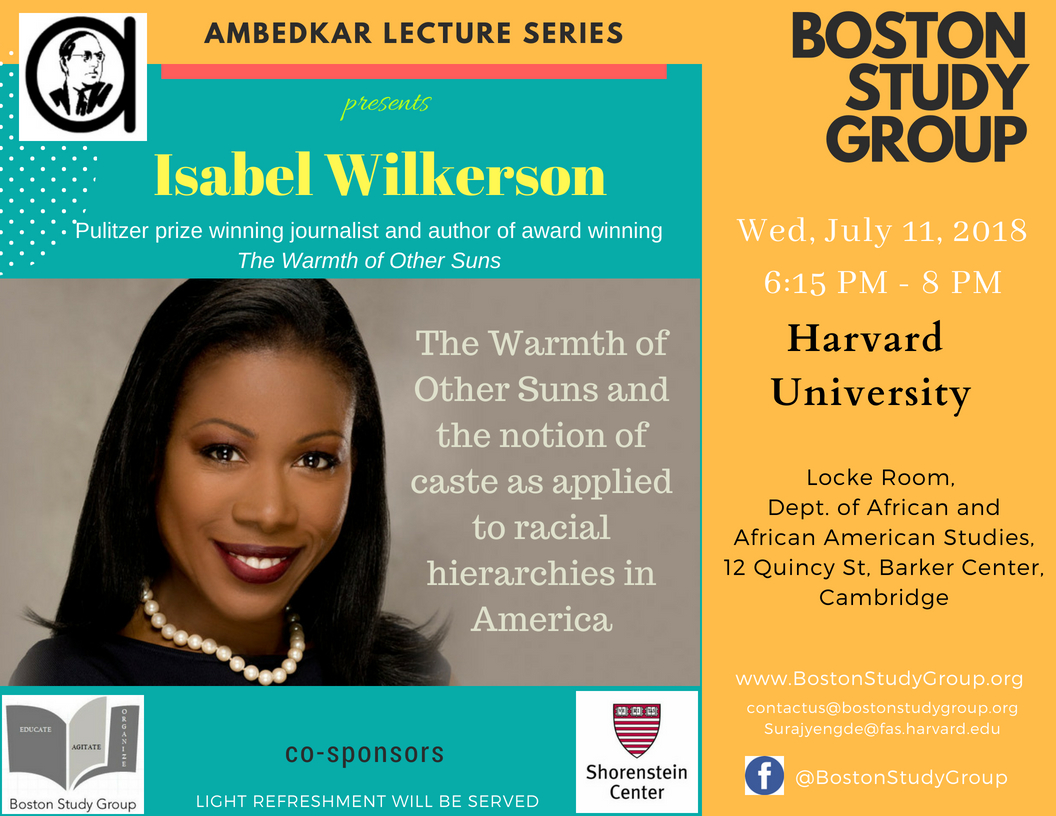
11TH JULY, 2018
Ambedkar Lecture Series-19
The warmth of Other Suns and the notions of caste as applied to racial hierarchies in America
BSG had its July month Ambedkar Lecture series on 11th July, 2018 on topic – The warmth of Other Suns and the notions of caste as applied to racial hierarchies in America by speaker Isabel Wilkerson. She is Pulitzer Prize winner.
Isabel Wilkerson is a gifted author; but also a very radical thinker. Boston Study Group is very proud to have her as our July speaker. Her book, ‘The warmth of other suns’ is the historical study of the Great Migration. ‘We have to understand that migration is not about geography; it’s a search for freedom’, Isabel emphasized. ‘The six million people in U.S. fled from one part of their own country to another to escape the caste system’. With clear insights from both sides, Isabel described Race as actually Caste in U.S. ‘You can explain the discrimination well if you think of it as Caste; so I use the word Caste.’ Isabel pointed out four main reasons that she believes it is better described as Caste while also acknowledging that there are perhaps many more things in common between both systems of power. Endogamy is the first big one. As caste system is survived through endogamy between the different castes, there was a strict control over mixed race marriages. The ‘one drop blood’ theory clearly describes that mixed race marriages and their offspring’s were looked down upon. Second, the concept of purity and pollution is applied to race similar to caste. Isabel cited that after migration, when Black communities settled in D.C., they faced the concept of pollution to a great degree. Often in bars their glasses were broken after they drank from them. Third, communities were delineated to their assigned roles to certain occupation in the society. Fourth, there was an attempt to bring divine ordination by distorting Churches for justification of dehumanization of communities. This is very starkly similar to how Caste perpetuates itself. Black communities were reminded to ‘stay in their own place’ and not ‘overstep’ their rules in social spaces, figuratively and literally. Isabel also shared many personal stories and of people she met during this journey of writing her book. She emphasized that the stories of communities fleeing from caste during Jim Crow era should be told with courage, fortitude and a sense of agency in their life rather than shame. ‘It was not giving up on life, it was a journey for new hope’, she smiled.
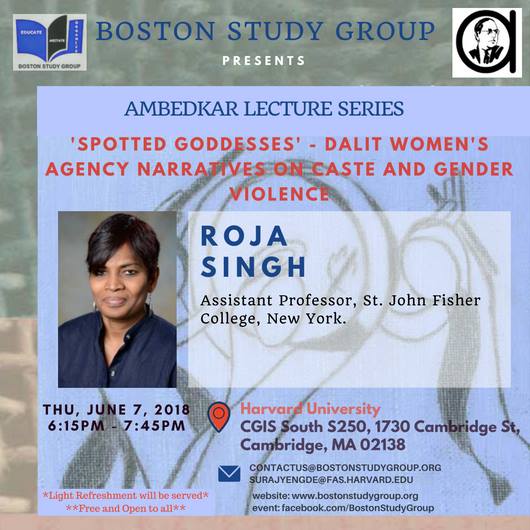
7TH JUNE, 2018
Ambedkar Lecture Series-18
Spotted Goddesses – Dalit Women’s Agency Narratives on Caste and Gender Violence
Youtube video link Ambedkar Lecture Series: Spotted Goddesses – Dalit Women’s Agency Narratives on Caste and Gender Violence
BSG had its June Ambedkar Lecture Series on topic: Spotted Goddesses, exploring Dalit women’s agency narratives on Caste and Gender violence by Roja Singh. She is currently Assistant Professor in interdisciplinary studies at St. John Fisher College, New York and President of Dalit Solidarity Forum in the USA, Inc. a nonprofit organization committed to the social and economic progress of Dalit communities. Roja’s ongoing research and social activism focus on intersections of caste, class, and gender in rural India as evident in the lives, experiences, leadership strategies, oral narratives and cultural expressions of Dalit communities of women in South India and other indigenous communities.
Roja Singh declared that the book is not about Dalit women as a homogenous group, but rather specifically about those with whom she has built a relationship in Tamil Nadu. She described the unique name of her book —Spotted Godesses—which is about Mariamman- a South-Indian Dalit Goddess whom Singh places on the lap of Dalit women who take care of her as she is a rejected wanderer kicked out of the pantheon of the dominant Gods and Godesses. She brings attention to the situations where Mariamman is both the inflictor and healer of ‘chicken pox’ and is thus respectfully feared as well as embraced by the community at the same time. She embodies the ambiguity of the lives of Dalit women that Singh has engaged with. She focused on how Dalit women also hold a similar space in our society; with being vulnerable to violence but also having the agency to make a change. Dr. Singh emphasized that Dalit women are considered as deviant and they defy ‘transgressing’ the norms of women set by dominant society. They subversively use stigmatizations of “difference” (for example. being portrayed as loud-mouthed, quarrelsome women) as tools of battle against injustice. They skillfully negotiate with local and state actors perpetrating violence. Activism for them is not learned but comes as a natural addressing of intersectionality through adapting “earthy humanness’ -a human response to injustice as a way of life. They share and create resources for their community’s good. In the ‘Singing bodies, Dancing minds’ section of her book, she compiles the beautiful images of a world where through wishful thinking Dalit women create and move about in a world where where they can live with dignity without fear. They also acknowledge the dangers that surround them, This is a poignant reality of what Dalit women undergo through physical and psychological violence and yet overcome with inner power of earthy humanness and audacious determination. Dr. Singh also shared her own experience of finding her Dalit roots, feeling the anguish of not knowing them from early on and finally embracing it wholeheartedly.
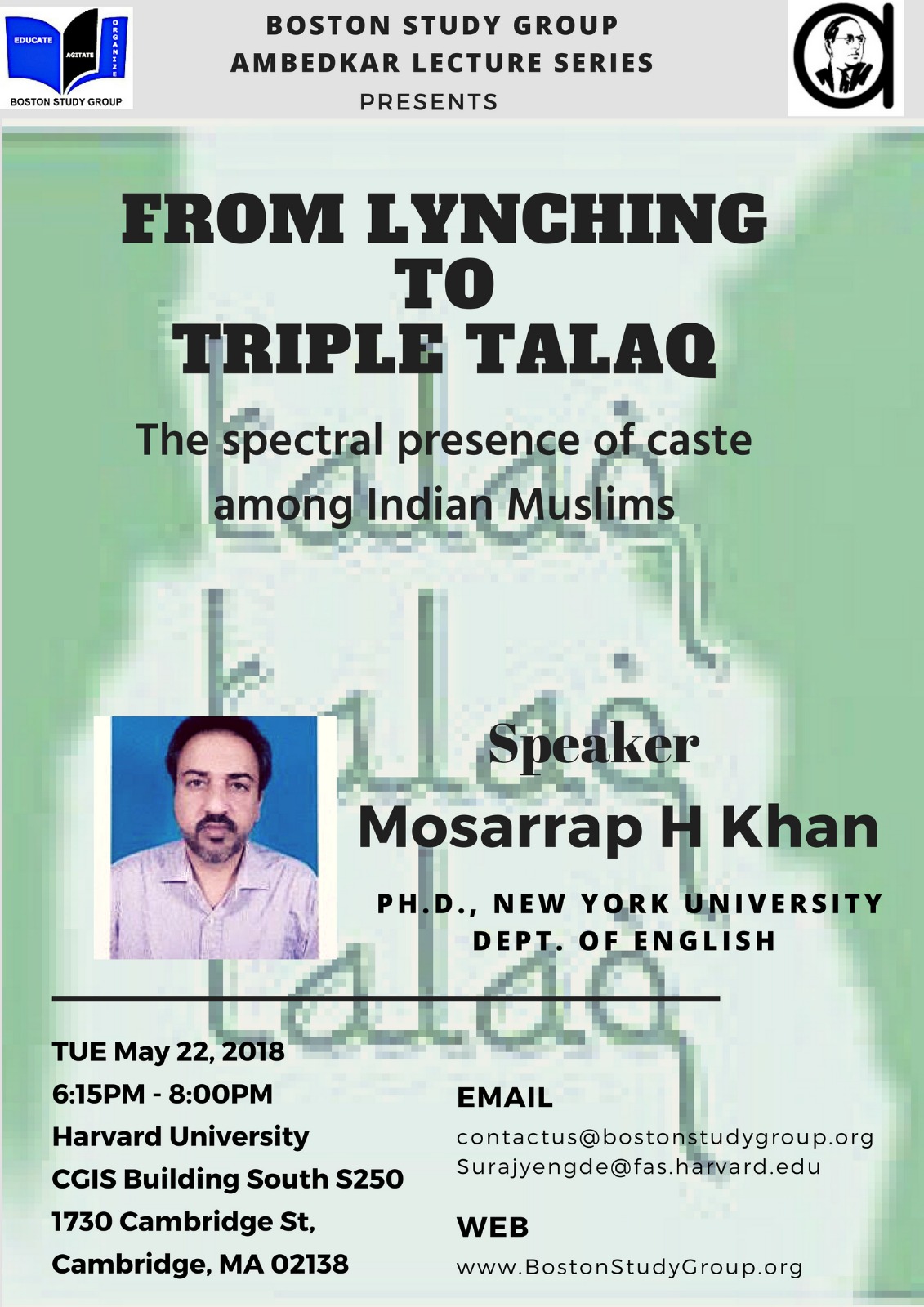
22ND MAY, 2018
Ambedkar Lecture Series-17
From Lynching to Triple Talaq
Youtube video link Ambedkar Lecture Series: From Lynching to Triple Talaq
– this lecture will demonstrate how the question of caste, which haunts the Muslim community as a specter, gets elided in these debates. The lecture will argue that we need to expand and deepen our understanding of the concept of caste if it were to have any analytical purchase for making visible modes of marginalization of Muslims within the majoritarian nation-space as well as within the Muslim community itself.
About author: Mosarrap H Khan has recently completed his doctoral dissertation at the Department of English, New York University, USA. Previously, he had taught at Kurseong College, University of North Bengal, Darjeeling, West Bengal, India, from 2002-07. His research interests include South Asian literature and culture, religion and secularism, theories of everyday life, and Muslim life in West Bengal. He is also a founding-editor at Cafe Dissensus, an independent magazine of culture, literature, and politics. Summary will be added soon.
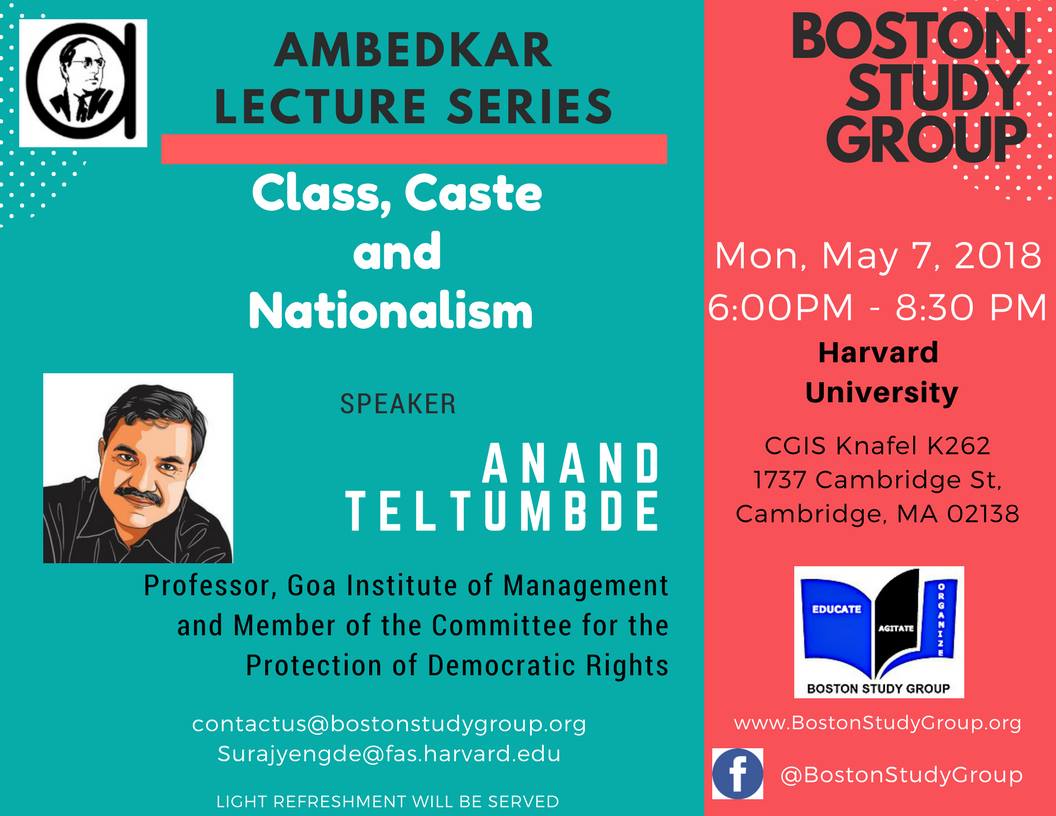
7TH MAY, 2018
Ambedkar Lecture Series-16
Caste, Class and Nationalism
Youtube video link Ambedkar Lecture Series: Caste, Class and Nationalism
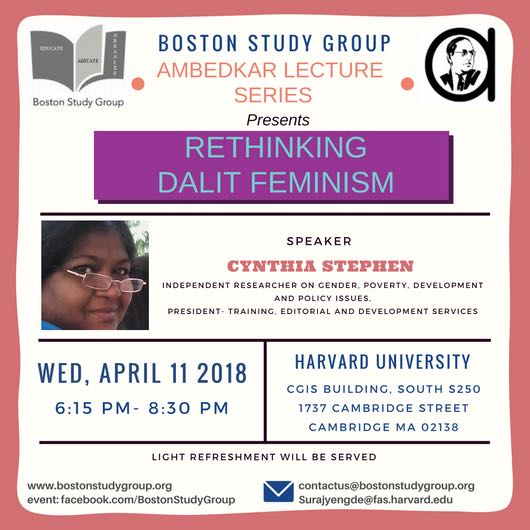
11TH APRIL, 2018
Ambedkar Lecture Series-15
RETHINKING DALIT FEMINISM
Youtube video link ![]() Ambedkar Lecture Series: Rethinking Dalit Feminism
Ambedkar Lecture Series: Rethinking Dalit Feminism
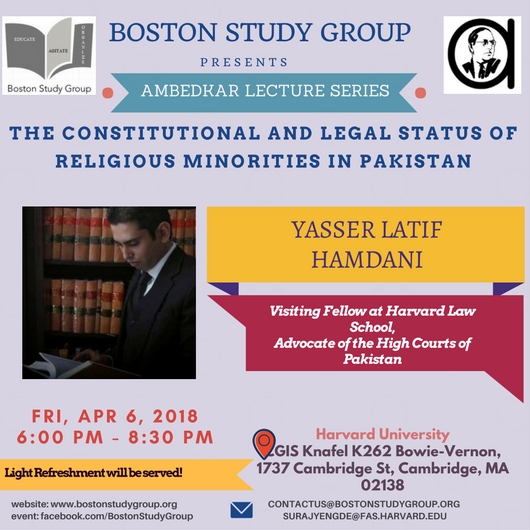
6TH APRIL, 2018
Ambedkar Lecture Series-14
THE CONSTITUTIONAL AND LEGAL STATUS OF RELIGIOUS MINORITIES IN PAKISTAN
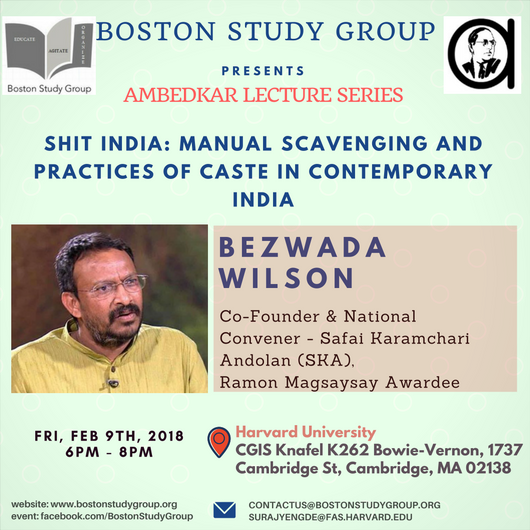
9TH FEBRUARY, 2018
Ambedkar Lecture Series-13
SHIT INDIA: MANUAL SCAVENGING AND PRACTICES OF CASTE IN CONTEMPORARY INDIA
Youtube video link Ambedkar Lecture Series: Shit India: Manual Scavenging and Practices of Caste in Contemporary India
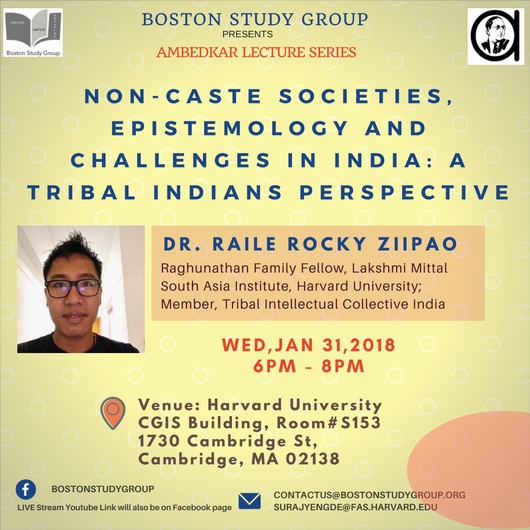
31ST JANUARY, 2018
Ambedkar Lecture Series-12
NON-CASTE SOCIETIES, EPISTEMOLOGY AND CHALLENGES IN INDIA: A TRIBAL INDIANS PERSPECTIVE
Youtube video link Ambedkar Lecture Series: Non-caste societies, epistemology and challenges in India: A tribal Indians perspective
BSG had its January Ambedkar Lecture Series on topic “Non-caste societies, epistemology and challenges in India: A tribal Indians perspective” by Dr. Raile Rocky Ziipao. Summary will be posted soon.
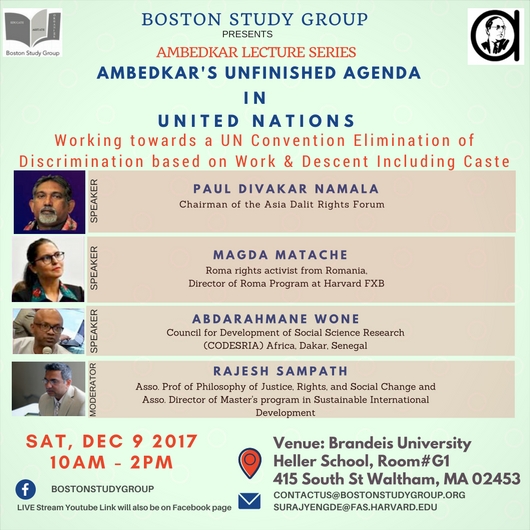
9TH DECEMBER, 2017
Ambedkar Lecture Series-11
AMBEDKAR’S UNFINISHED AGENDA IN UNITED NATIONS
Youtube video link Ambedkar Lecture Series: Ambedkar’s Unfinished Agenda in United Nations : Part 1 Part 2 Part 3
A talk and panel discussion, organized by Boston Study Group on Saturday, 9th December, 2017 at Brandeis University was enriching in more than one way. The discussion brought together speakers from various countries and communities together to discuss forms of marginalization which affects them all. The opening remarks were made by Dr. Suraj Yengde, W.E.B. Du Bois fellow, Harvard University along with introduction of the speakers, and the session was moderated by Dr. Rajesh Sampath, Associate Prof of Justice, Rights and Social Change, Heller School of Social Policy and Management.
‘We have survived, we will survive- but the political interest will not survive if we don’t listen to 200 million whose rights are being compromised.” Paul Divakar Namala, Chairman of Asia Dalit Rights Forum opened his talk with this powerful statement. He enlightened the audience about the construction of ‘work and descent’ terminology by UN which was due to a failure to capture the discriminatory practices altogether in a word. He emphasized on developing a common language among different communities facing discrimination to bring the issue to the forefront instead of working in isolation at grassroots. He remarked, “Global focus is important to prevent overshadowing of our discrimination”.
Magda Matache, Director of Roma program at Harvard University sketched an outline of the various discriminations being faced by Roma community who are being referred as ‘athingalos’ meaning untouchable. She explained that less than 1% of the Roma population was in colleges and only 10% succeeded at high school level. Roma populations also faced severe discrimination in job market and were not considered competitive enough. She emphasized that Roma population needs to have a social capital to atleast say what is right and what is wrong. Her call was to shift the focus from ‘’Minority as the problem to Majority as the target’’ for social change.
Abdarahmane Wone, Council for Development of Social Science Research, Senegal focused on the slavery which is being faced by Haratin people even now, mentioning that ‘’Past is Present and Present is Past’’ for them. He spoke about the intersection of discrimination against Haratin people who were not only black but also descendants from families of slaves. Thus, it is an inter-generational marginalization which they face. While emphasizing on the globalization of the issue, Abda remarked that media and internet have brought the world smaller which should be harnessed in the fight against discrimination.
The panel discussion after lunch was a vibrant conversation between these brilliant speakers who responded to many questions from the audience and imagining an outline to work together in future. The talk had a total attendance of 20 participants apart from online viewership.
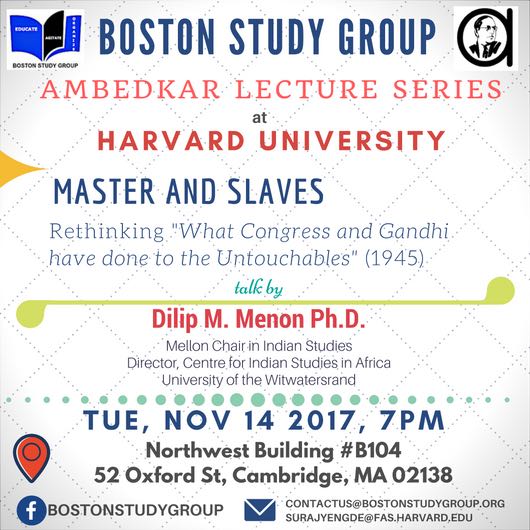
14TH NOVEMBER, 2017
Ambedkar Lecture Series-10
MASTER AND SLAVES
Youtube video link Ambedkar Lecture Series: Master and Slaves
BSG had its Ambedkar Lecture Series of the November month on topic Master and Slaves: Rethinking “What Congress and Gandhi have done to the Untouchables” (1945), by Dr. Dilip M. Menon, University of Witwatersrand, South Africa.
The talk looked critically at this statement of Ambedkar’s opposition to the politics of nationalism as embodied in the Indian National Congress and Gandhi. It is an excoriation of the bad faith represented by the nationalist policy of transforming the struggle for recognition by untouchables in India from a political strategy of separation into a guided one under the nationalist umbrella. Apart from a critique of ameliorative politics, Ambedkar offers a rejoinder to Gandhi’s fast of 1930 which put paid to the idea of separate electorates for untouchables as a guarantee of political equality. The epigraph to the book from Thucydides, “It may be your interest to be our masters, but how can it be ours to be your slaves”, introduces a radical reframing of the relation between nationalist leaders and the untouchables.
Summary from the talk:
Ambedkar Lecture Series for November included a talk by Prof. Dilip M. Menon, Director, Center for Indian studies in Africa, University of Witwatersrand, South Africa. He focused his talk on ‘Master and Slaves’ using the analogy for Gandhi and Untouchables. He explored the ideology of Dr. Ambedkar as seeking fraternity vis-à-vis Gandhi who valued his reputation more as the savior of untouchables. While the ‘humiliating railway experience’ of Gandhi in South Africa is well advertised, Ambedkar’s struggle and humiliation is ‘normalized’. This itself speaks to caste dynamics of historians and selective writing of history. Discussing, Dr. Ambedkar’s text, What Gandhi and Congress have done to Untouchables?, Menon maintained that Ambedkar writes about what they have done ‘to’ the untouchables not ‘for’ the untouchables since their contribution to the community is not positive but indeed harmful. While Gandhi maintained that the question of caste was religious, it was oxymoronic on his part that untouchables existed in Hinduism through exclusion. Ambedkar advocated for direct action and social mobilization apart from the Constitution which he saw existing in the liberal framework of democracy wherefore law was inadequate to create fraternity. The idea of fraternity or ‘Maitri’ comes from Buddhism which itself emerged from rebellion against Brahminical forces to begin with. The lecture shed light on various myths around Gandhi as a tall leader who dwarfs in the magnanimity of Ambedkar’s justified presence in the Indian politico-social scene. By bringing forth an alternative narrative of the harm done by Gandhi’s regressive ideology for the untouchables as compared to Dr. Ambedkar who envisioned a society based on liberty, equality, and fraternity, Menon concluded that Ambedkar needs to be read in various gestures to get a grasp of his scholarship and vision.
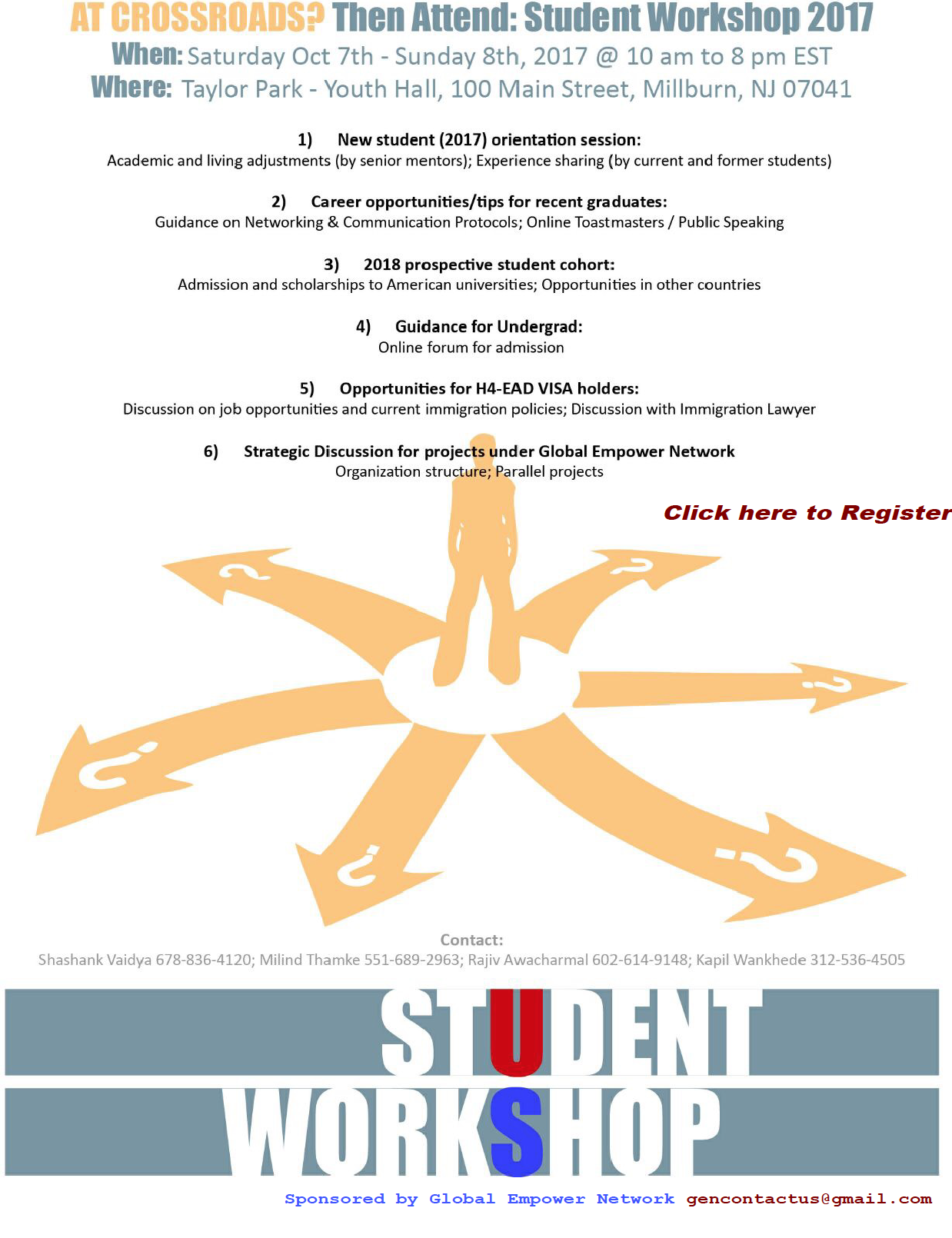
7TH-8TH OCTOBER, 2017
Student Workshop 2017
You might have attended or heard about the Students Workshop 2017 organized by GEN-Global Empower Network, the US Ambedkarites Collective, on Saturday Oct 7th 2017 in NJ that received an overwhelming response, especially from our students in India who joined online and sat throughout the night for attending the entire workshop. At the conclusion of the workshop one of the feedbacks we received from both mentors and students alike is that we want to expand the students-mentor initiative across India, across disciplines for higher studies both in India and abroad.
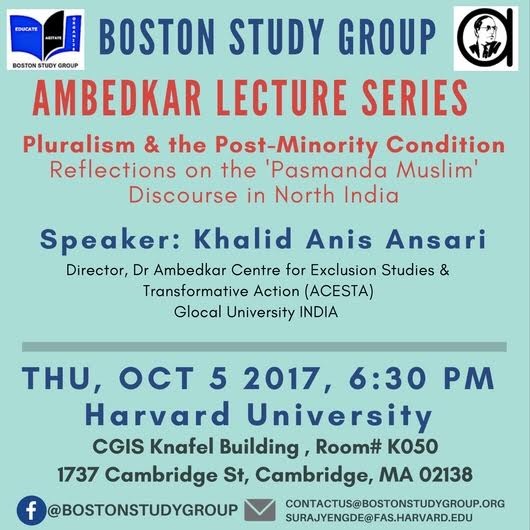
5TH OCTOBER, 2017
Ambedkar Lecture Series-9
PLURALISM AND THE POST-MINORITY CONDITION
Youtube video link Ambedkar Lecture Series: Pluralism and the Post Minority Condition by Speaker – Khalid Anis Ansari
BSG had its Ambedkar Lecture Series of the October month on topic “Pluralism and the Post-Minority Condition” at Harvard University. Speaker of the lecture series will be Mr. Khalid Anis Ansari.
Khalid Anis Ansari is a Director, Dr. Ambedkar Centre for Exclusion Studies & Transformative Action (ACESTA), Glocal University, India. He works in the field of social and cultural theory and is interested in grassroots organizing, scholarly interventions to publicize the history of resistance movements, and the social and political aspirations of subordinated caste Pasmanda Muslims. He was awarded the HIVOS PhD Fellowship—Pluralism Knowledge Programme (2010-2013) for his doctoral work on caste movements among Indian Muslims with the University of Humanistic Studies (UvH), Utrecht, the Netherlands.
Summary from the talk:
Dr. Khalid Anis Ansari enlightened the group about aspects of discrimination within the Muslim community. ‘Minority politics has failed Pasmanda community’, he said explaining that although 85 percent of Muslims in India are from Pasmanda (or Dalit) community, they face economic and social violence at the hands of ‘upper-caste’ Muslims. He emphasized that Pasmanda Muslims are grossly underrepresented in parliament and do not have any attention directed towards them as Muslims are grouped together as a minority. Although caste system is not ‘supposed’ to exist in Islam, segregation in mosques and graveyards is a common occurrence in India which shows that caste transcends religion. The ‘Pasmanda movement’ led by many scholars such as Ali Anwar embraces the identity of Pasmada group and is trying to raise awareness about the ‘fake’ minority narrative of upper caste Muslims. The movement stands to advocate for Pasmanda Muslims in relation to issues of personal law, reservation and electoral politics, as well as demands of legal action against physical violence on the community. The lecture highlighted the need for scholarship among other religious groups which face caste-based discrimination as a culture of harm.
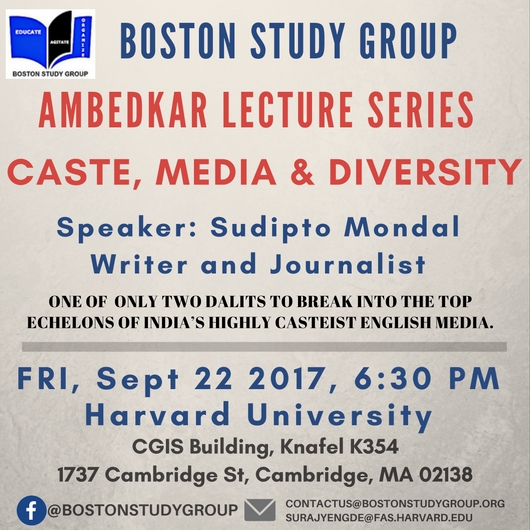
22ND SEPTEMBER, 2017
Ambedkar Lecture Series-8
CASTE, MEDIA AND DIVERSITY
Youtube video link Ambedkar Lecture Series: Caste, Media and Diversity by Speaker – Sudipto Mondal
BSG had its September month Ambedkar Lecture Series on the topic “Caste, Media and Diversity” at Harvard University. Speaker of the lecture series was Mr. Sudipto Mondal, a writer and journalist who is one of few dalits to break into the top echelons of India’s highly casteist english media. He visited U.S. in connection with his upcoming book. Sudipto shared precepts from his book with the group. He weaved a poignant and heart-warming tale of struggle of our young Dalit icon, Rohith Vemula which has shaped the contemporary anti-caste struggle in many ways. The connections and social movements after Rohith’s institutional murder including Jignesh Mewani’s role in boycotting cow skinning in Gujarat and student resistance in universities was discussed. It was followed by a lively discussion among the author and audience about resistance within classrooms and his own struggle within the casteist media groups. The lecture highlighted another aspect of caste discrimination within Indian society and emphasized on the values of resistance to hold fast Ambedkarite struggle in India.
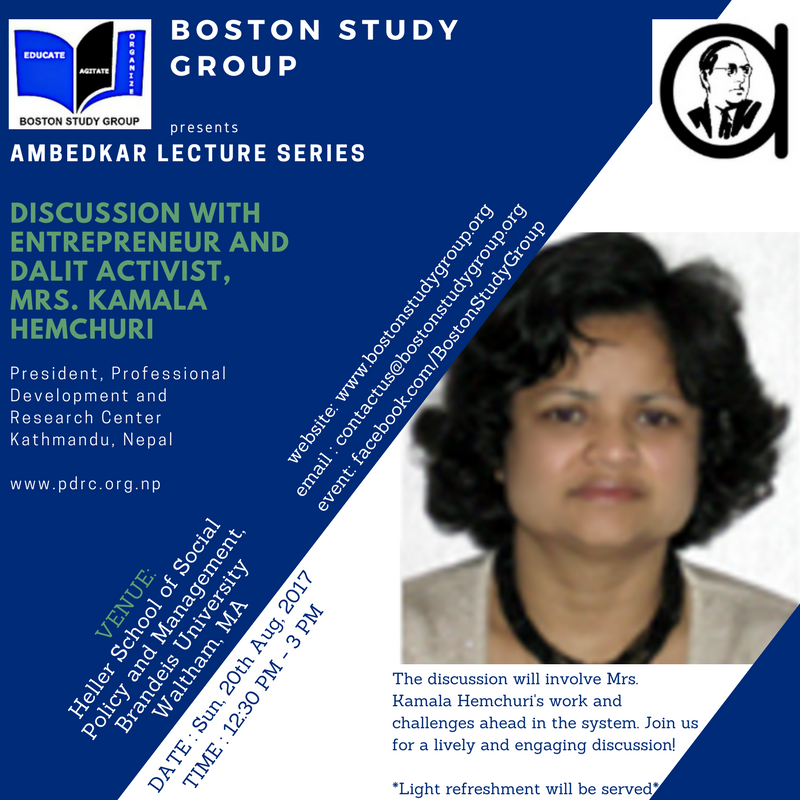
20TH AUGUST, 2017
Ambedkar Lecture Series-7
DISCUSSION WITH ENTREPRENEUR AND DALIT ACTIVIST
Mrs. Kamala Hemchuri, is a prominent Dalit women activist. She has been a very active civil society leader in the country changing lives of Dalit youth through education. By equipping hundreds of Dalit youths with skills and competency required for a self-sustained and dignified life, PDRC (www.pdrc.org.np) has carved a distinct niche for itself amidst a number of organizations working in the field of education and competency development.
Summary form the discussion:
Kamala Hemchuri, a Dalit activist and entrepreneur from Nepal joined Boston Study Group for ‘Ambedkar Lecture Series’ for August. She is President of ‘Professional Development and Research Center (PDRC)’, an organization working to empower Dalit youth in Kathmandu, Nepal. She was joined by Reemya from New Jersy, who herself has worked for PDRC for many years. She has recently translated Dr Ambedkar’s iconic text ‘Annihilation of Caste’ in Nepali language and published it. Dalits in Nepal have actually not read Dr. Ambedkar due to inaccessibility of language. She believes that unless the masses are educated about the ideas to break caste, they will not be able to emancipate themselves. She has gifted one copy of her book to Boston Study Group. She is now in the process of translating ‘Who are Untouchables’ into Nepali as well.
Post introductions and a hearty lunch, Kamalaji explained about the Dalit context in Nepal. While constitution of Nepal was being drafted, representation of Dalits was a constant issue they faced. She explained how even after agreement of certain affirmative action policies, Dalit rights were being violated. Eventually, certain representation of Dalits was included in the constitution after constant struggle. She emphasized that there is a huge gap between political movement and cultural movement in support of Dalits in Nepal, which is not very different from India.
Sharing some statistics, Kamalaji mentioned that according to Government of Nepal there are only 13% Dalits while in actual (as per many surveys by other agencies) there are 20% Dalits in Nepal who amount to about 6 million people. Of these more than 50% live under poverty line. Dalit female literacy rate is only 24% and school drop-out rate for Dalits is very high. Amidst this, there are very minimal efforts being taken by government for improving their lives, socially as well as economically. She believes that education is the key.
PDRC has been working to empower Dalit youth by providing them career exposure and mentoring them for various career choices. Thousands of Dalit youth in Nepal have benefitted by associating themselves with PDRC as they become doctors, engineers, lawyers and civil servants. PDRC has recently registered a branch in Baltimore as a 501 (c) organization in order to raise funds for Nepal chapter. Many students are now interested in studying abroad but do not have any guidance for this. Apart from scholarships, these young minds need nurturing and help to navigate the education system here. This is expected to be a collaboration point between PDRC and Boston Study Group.
It was requested by Kamalaji for Boston Study Group to be engaged in this effort to provide mentoring support for Dalit youth from Nepal who do not know much about the higher education sector in U.S. Boston Study Group has affirmed that they would be more than happy to collaborate with PDRC in this effort and will provide handholding support to Dalit youth from Nepal for preparing them to study abroad. However it is essential to have mentors and a lead role from Nepali counterparts in this effort. Kamalaji has assured that she will identify and introduce Boston Study Group members to other Nepali Dalits who want to collaborate for mentoring Dalit youth from Nepal. This seems like a new beginning for Boston Study Group to engage in cross-country collaboration for improving access and mentoring support to young minds who want to break free from the chains of caste. Jai Bhim!
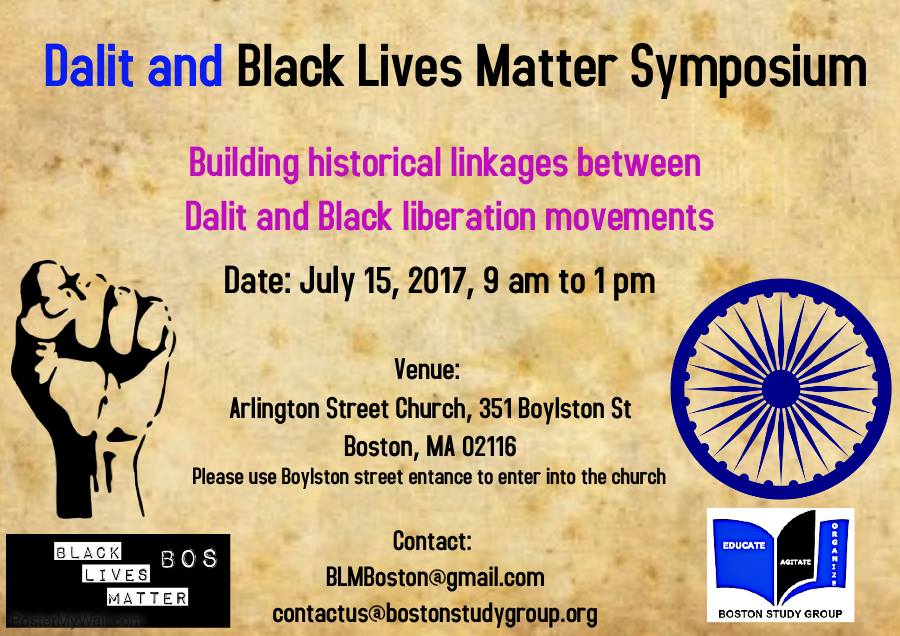
15TH JULY, 2017
Dalit and Black Lives Matter Symposium
The Dalit and Black Lives Matter Symposium was co-hosted by Black Lives Matter, Boston and Boston Study Group to explore the dehumanizing caste system in India and the Dalit resistance. This symposium was first of its kind in the world where voices against injustice came together from different national communities. It also looked at the historical linkages of Dalit-Black solidarity from India, South Africa to the Civil Rights Movement and Black Panther Party as well as linkages between the two modern liberation movements.
This symposium consisted of political education, information about current local and transnational work, and imagining greater solidarity.
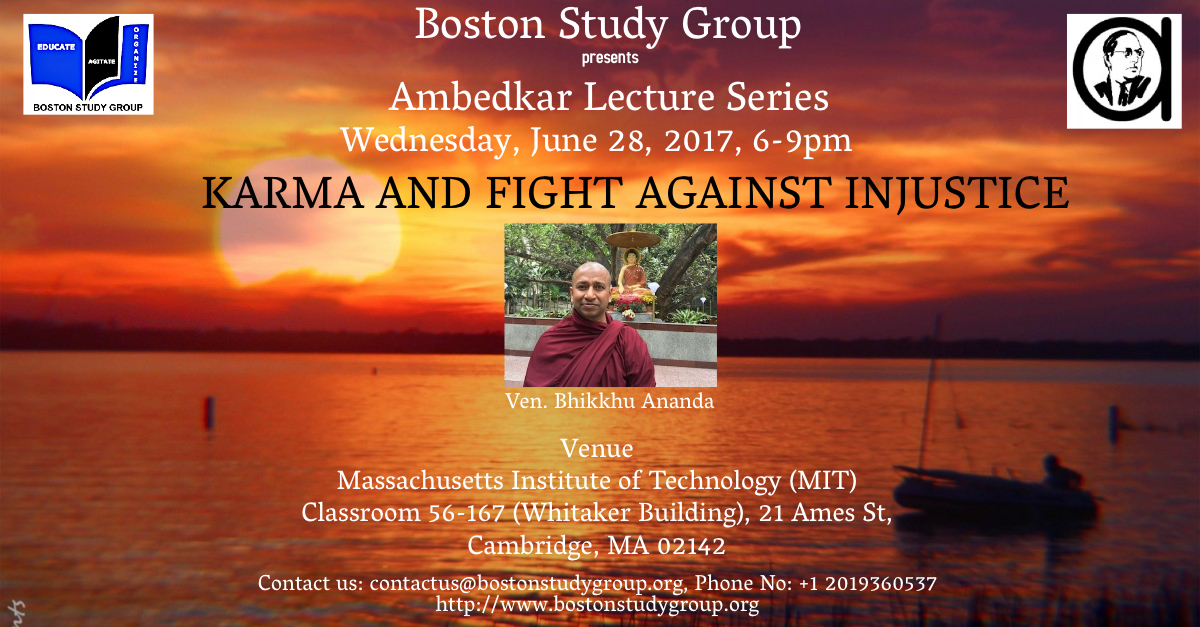
28TH JUNE, 2017
Ambedkar Lecture Series-6
KARMA AND FIGHT AGAINST INJUSTICE
Boston Study Group presents, Ambedkar lecture series on topic Karma and Fight Against Injustice delivered by venerable Bhante Ananda, Secretary of Maha Bodhi Society (Bangalore, India).
Time: 6pm to 9pm
Venue: Massachusetts Institute of Technology (MIT) Classroom 56-167 (Whitaker Building), 02139, 21 Ames St., Cambridge, MA 02142
Highlights from the talk:
Intention we produce in our mind is karma. Having intended one performs actions through part, through speech and through mind and whatever action we do that is ‘kamma’ or karma. When we produce intention and we perform the action — it is a force that produces karmic energy that which has capacity give results. We are acting everyday with intention based on ignorance or generosity/wisdom i.e. Wholesome and unwholesome mind.
Without intention actions are not karmas.It is not same as killing a person. Intention is what makes it an action .Kamma is the intention and the action that you perform following the intention.
First verse of Dhammapada –
Manopubbaṅgamā dhammā manoseṭṭhā manomayā
Manasā ce paduṭṭhena bhāsati vā karoti vā
Tato naṃ dukkhamanveti cakkaṃ’va vahato padaṃ.
Mind precede everything. Before everything mind moves. Mind is the greatest thing. It is mind made.
Among the people there exists three kind of views:
1. Predetermination –because of the past kamma
2. Everything is god controlled
3. Whatever happens it is without cause and without reason
Buddha rejected all the above views by saying if everything is fixed where is the thing of changing it for improvement or progress ?We can change the course of life even at the very last moment of our life by doing good.
Injustice is something unpleasant is happening.There are 24 conditions among them, kamma is one. We can change the influences of the past and the present karma.
How are you going to deal with the people who are doing injustice to you? –We should be able to get good things from the people and leave aside the bad things. With compassion and action, you should fix the problem of injustice.
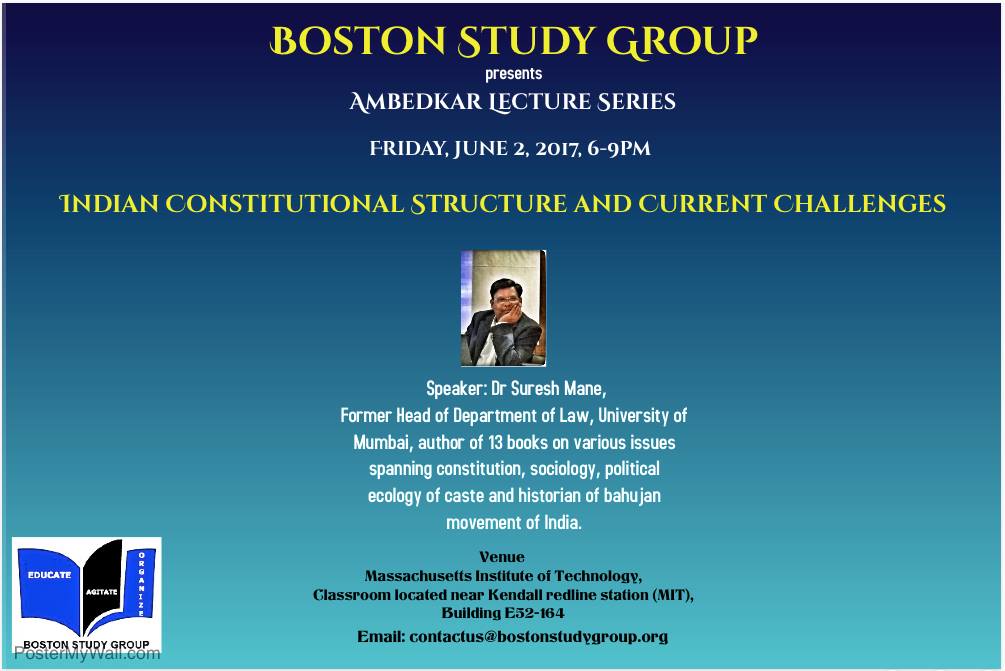
2ND JUNE, 2017
Ambedkar Lecture Series-5
INDIAN CONSTITUTIONAL STRUCTURE AND CURRENT CHALLENGES
Youtube video link Ambedkar Lecture Series: Indian Constitution, Structure, and Current Challenges – Prof. Suresh Mane
Boston Study Group presents, Dr Suresh Mane, former Head of Department of Law, University of Mumbai, author of 13 books on various issues spanning constitution, sociology, political ecology of caste and historian of bahujan movement of India. An imminent intellectual of noted calibre Dr Mane will deliberate upon the Constitutional challenges in the age of right wing populism and the comparative prospects of Afro-American and Dalit experiences.
Venue: Classroom located near Kendall redline station (MIT),
Building E52-164
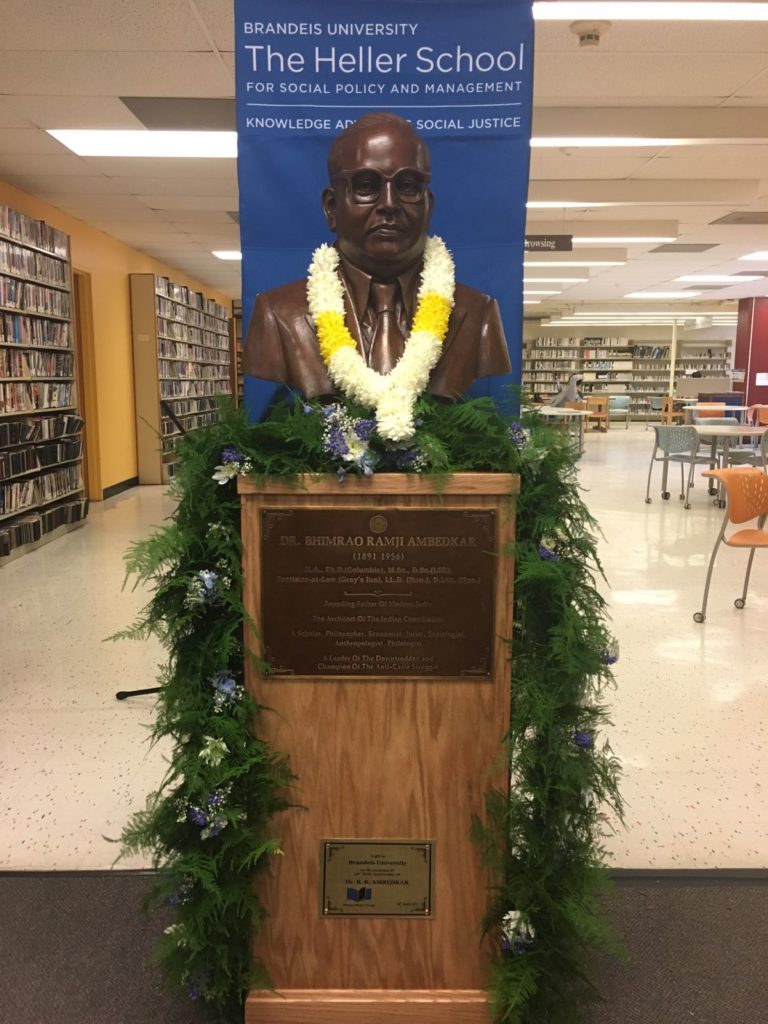
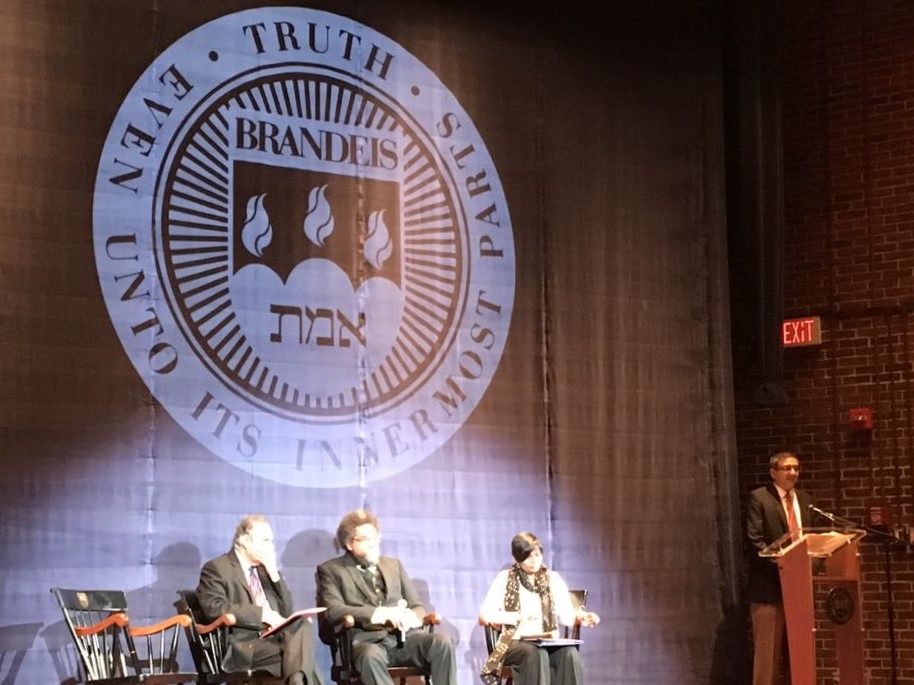
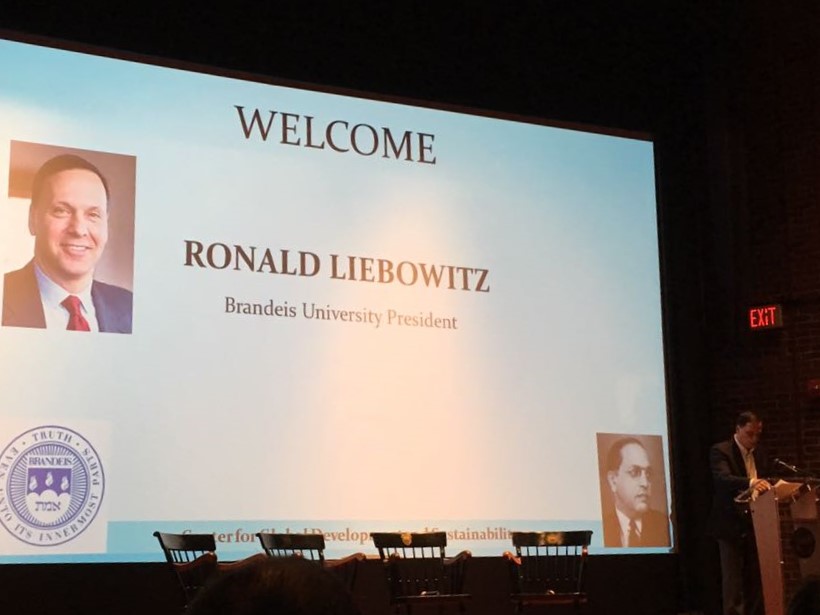
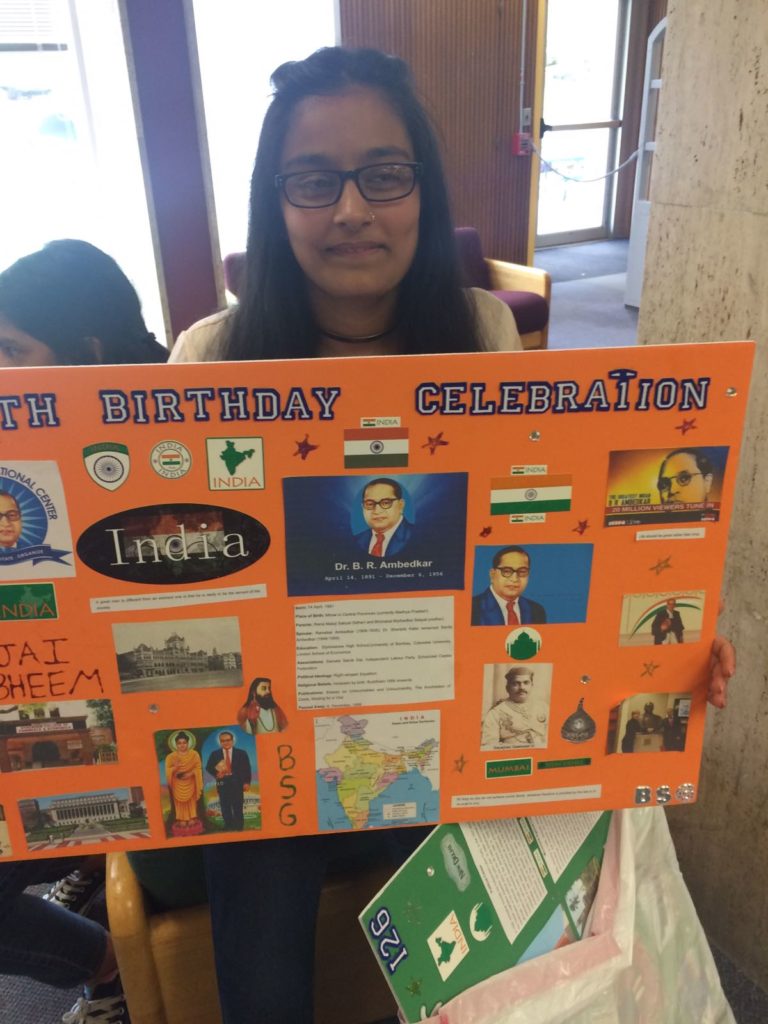
प्रेस विज्ञप्ति
डॉ. आंबेडकर की प्रतिमा का अनावरण अमरीका की ब्राण्डेयस यूनिवर्सिटी लाइब्रेरी में जाती-व्यवस्था पर तीसरी वार्षिकी कॉनफेरेन्स में बीएसजी की भागेदारी और आंबेडकर जयंती के अनुष्ठान का आयोजन
Youtube video link Short Recap of BSG participation @ Brandeis Conference 2017
अमरीका के बॉस्टन नगर के निकट स्थित विश्वविद्यालय ब्राण्डेयस यूनिवर्सिटी में जाती-व्यवस्था एवं वर्णभेद पर आयोजित तीसरा वार्षिक सम्मलेन संपन्न हुआ जिसमें बॉस्टन स्टडी ग्रुप (बीएसजी) की महत्वपूर्ण भागेदारी रही | डॉ. बी.आर.अम्बेडकर की १२६वीं जयंती के अवसर पर उनकी प्रतिमा की स्थापना व अनावरण का समारोह बी एस जी के सौजन्य से संपन्न हुआ | इस मूर्ति स्थापना से ब्राण्डेयस यूनिवर्सिटी अमरीका में केवल दूसरी ऐसी संस्थान होगी जहाँ डॉ. अम्बेडकर की प्रतिमा मौजूद होगी – इससे पहले उनकी मातृ शिक्षा-संस्था (एल्मा मेटर) , न्यू यॉर्क शहर की कोलंबिया यूनिवर्सिटी में उनकी प्रतिमा की स्थापना १९९५ में हुई थी |
कांफ्रेंस की शुरुआत करते हुए ब्राण्डेयस यूनिवर्सिटी के प्रेजिडेंट रोनाल्ड लेबोविट्ज़ ने कहा की जाती-व्यवस्था एक मानवाधिकार का अहम् मुद्दा है जिससे निपटना अतिआवश्यक है | उन्होंने कांफ्रेंस में बीएसजी की भूमिका की प्रसंशा की | इस अवसर पर भारत के जवाहरलाल नेहरू विश्वविद्यालय के पूर्व प्राध्यापक व अर्थशास्त्री सुखादेव थोराट, हार्वर्ड विश्वविद्यालय के प्रोफेसर कॉर्नेल वेस्ट के साथ कई अन्य शिक्षक, विद्यार्थी और अम्बेडकरवादी भी उपस्थित थे |
प्रतिमा की स्थापना विश्वविद्यालय की गोल्डफार्ब मुख्य लाइब्रेरी में २९ अप्रैल को शाम ५:३० बजे हुई और इस अवसर पर विश्विद्यालय की एक मुख्या पदाधिकारी (प्रोवोस्ट), लीसा लिंच, प्रस्तुत थीं | साथ-साथ देश-विदेश से शैक्षिक और अम्बेडकरवादी शुभचिंतकों ने भी भारी संख्या में हिस्सा लिया|
बीएसजी ने इस कॉनफेरेन्स में तीन चर्चा-गोष्ठी भी आयोजित करीं – एक दलित पितृसत्ता पर, दूसरी धर्म में जाती-विरोधी परिकल्पना पर और तीसरी दलित एवं अंतर्राष्ट्रीय एकता पर | इनमें विभिन्न विद्वानों और समाजसेवकों ने अपने मत रखे |
डॉ. अम्बेडकर की १२६वीं जयंती पर एक रंगारंग सांस्कृतिक कार्यक्रम, सुरताल, का भी २९ अप्रैल की संध्या को बीएसजी ने आयोजन किया | इसमें प्रसिद्ध शास्त्रीय गायक पंडित सुधाकर चह्वाण ने अत्यंत मधुर राग एवं अम्बेडकरीय रचनाएँ पेश करीं | बाल कलाकार स्वदीप कांबले ने एक प्रभावशाली अम्बेडकरवादी कृति पढ़ी | इस मौके पर रीमा रोशन लाल और प्रिया रोशन लाल बहनों की जोड़ी ने डॉ. आंबेडकर की जीवनी और अम्बेडकरवादी विचारों पर अत्यंत खूबसूरत चित्रकला का प्रदर्शन किया |
बीएसजी इस मौके पर डॉ. शोभा सिंह, डॉ. लक्ष्मी बैरवा, (स्वर्गीय) डॉ.ओमर खालिदी और सुश्री थेनमोरि सौंदरराजन को जाती-व्यवस्था के उन्मूलन के संघर्ष में महत्त्वपूर्ण भूमिका निभाने के लिए सम्मानित करेगी | जाती-व्यवस्था का विषय बीएसजी के लिए एक अहम् विषय है और वह उस पर अन्य कई गुटों के साथ एकजुट हो कर संघर्ष कर रही है |
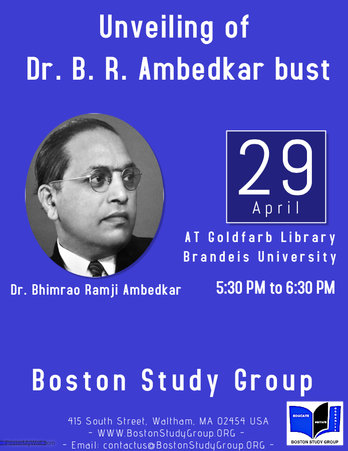
Unveiling Ceremony of Dr. Ambedkar’s Bust at Library of Brandeis University
Brandeis University has accepted Boston Study Group’s donation of Dr Babasaheb’s bust and has agreed to install it in Library of Brandeis University during the 3rd Annual International Conference on “Unfinished Legacy of Dr. Ambedkar”. This will be second University in USA after Columbia to have Babasaheb’s bust and we believe this will be historic moment for our generation who could not witness installation of Babasaheb’s bust in Columbia University.You all are cordialy invited for this ceremony and Dr Babasaheb Ambedkar Jayanthi celebration on 29th April 2017.Venue: 415 South Street, Waltham, MA 02454, USA
Please sign-up here to subscribe to event updates or visit this page for details
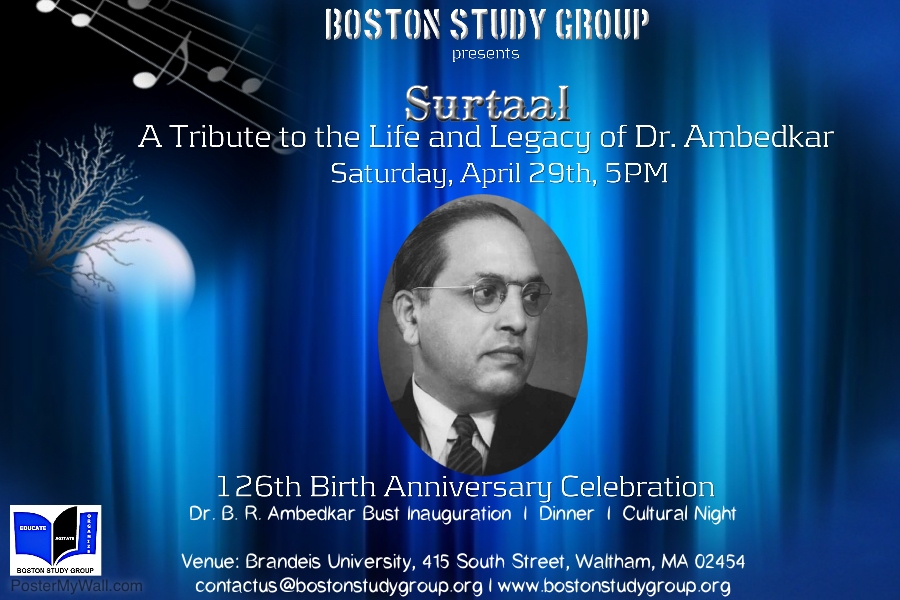
“Surtaal” – A Tribute to the Life and Legacy of Dr. Ambedkar
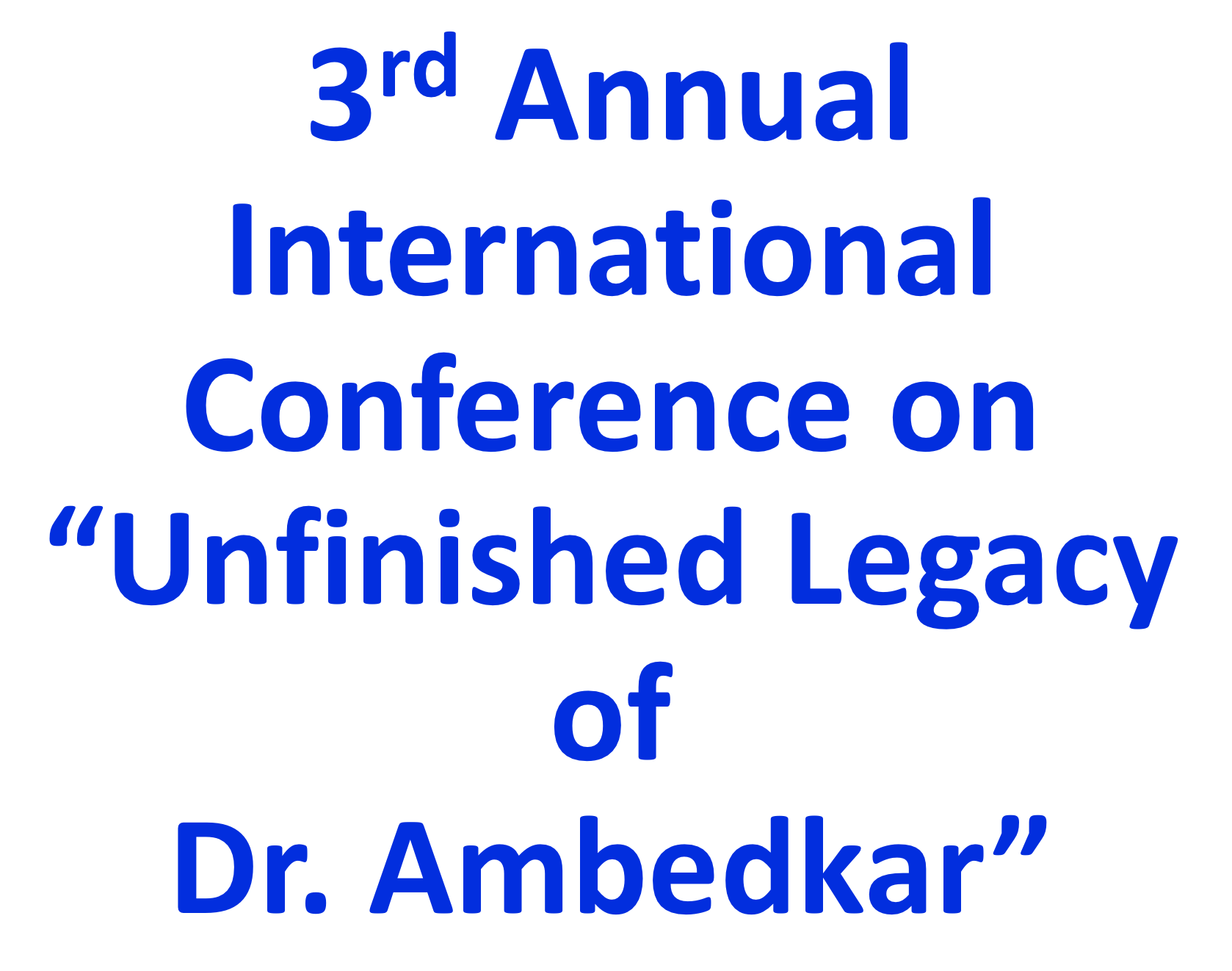
28TH-30TH APRIL, 2017
3rd Annual International Conference on the Unfinished Legacy of Dr. B.R. Ambedkar
Boston Study Group is honored to be a part of the historic 3rd Annual International Conference on the Unfinished Legacy of Dr. B.R. Ambedkar to be held at Brandeis University, Boston, Massachusetts from April 28 – April 30, 2017. The theme of the conference is Re-imagining Religion, Caste, and Social Justice in South Asia. The initial deadline for submission is March 3rd, 2017. Extensions may be granted in some circumstances. More details are available here: https://heller.brandeis.edu/gds/28th-april-conference/call-for-papers.html.
We encourage Ambedkarite students, student leaders, researchers, and faculty to consider submitting an abstract. Members from BSG or from Brandeis University can guide you through the application process. You can email us at contactus@bostonstudygroup.com
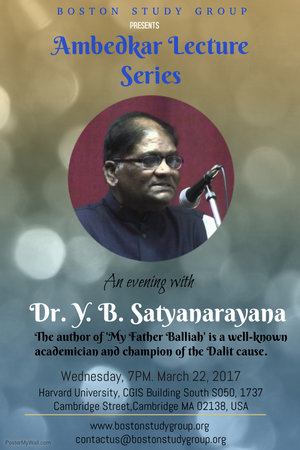
22ND MARCH, 2017
Ambedkar Lecture Series-4
BSG has organized its this month lecture series with honorable Dr. Y. B. Satyanarayana. He is author of “My Father Balliah”, a well-known academician and champion of the Dalit cause.
Venue: Harvard University, CGIS Building South S050, 1737 Cambridge Street, Cambridge MA 02138, USA
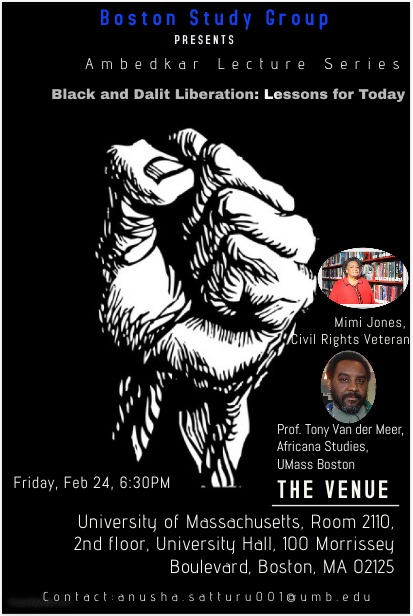
24TH FEBRUARY, 2017
Ambedkar Lecture Series-3
BSG Monthly Lecture Series in Honor of Black History Month presents Black and Dalit Liberation: Lessons for Today
A conversation with Mimi Jones, Civil Rights Leader & Prof. Tony Van Der Meer, Africana Studies, UMass Boston.Friday, Feb 24, 6:30 pm | UMass Boston 2110, University Hall, 2nd Floor | 100 Morrissey Boulevard, Boston, MA 02125
Internationalism was a hallmark of the Black Power movement. It included engagement and identification with third world movements. A little known impact is the formation of the Dalit Panthers in urban Western India in 1970 to fight caste oppression. Currently well over half a billion people in India are victims of the caste system, with at least 270 million designated by dominant ideology as ‘untouchable’.
The parallels between ‘racial’ and caste oppression extend to on-going lynching and sexual violence, resurgence of supremacist ideology, cultural hegemony, escalating accumulation of economic power, and lack representation at all levels of power. On the flip side, both movements suffer/ed from serious deficiencies including the pitfalls of ‘charismatic masculinity‘, oppressive behavior, relegation of the lessons of feminism, and an inability to build long-term, equitable, sustainable, and autonomous mass movements.
Mimi Jones and Tony Van Der Meer will share their insights on movement building – past and present, and reflect on lessons and pitfalls from the past. We will also explore themes of solidarity building between the Black and Dalit movements and implications for future organizing.
Mimi Jones, long time Roxbury resident and community activist, was on the front line in the Civil Rights Movement as a youth. As a teenager during the height of the Movement in the 1960’s, she pursued and engaged in direct action to confront and challenge racism, segregation and discrimination. She was involved in a myriad of grassroots organizing and social and political campaigns waged by the Student Nonviolent Coordinating Committee (SNCC) and the Southern Christian Leadership Conference (SCLC).
Professor Van Der Meer is the former Chairman of the Black Political Task Force of Boston. Professor Van Der Meer’s area of research is focused on African diaspora religion and culture and its image in the mass media. He is a specialist in Community Economic Development and Urban Politics.

30TH SEPTEMBER, 2016
Ambedkar Lecture Series-2
In the Ambedkar lecture series segment was a talk by fervent Dalit rights activists and student leaders from New Delhi Sanghapali Aruna Lokhitakshi. Ms Sanghapali spoke on the topic “The role of Dalit women in movement building” offering historical and contemporary glimpses of contribution of the Dalit women in social and civil rights movement. Reporting on the activities of her organization, BAPSA (Birsa Ambedkar Phule Students Association) Ms Sanghpali offered insights on the university campus student alliances of Dalitbahujan student groups.
Ms Sanghapali’s talk highlighted the issues of appropriation of Indian left organizations to suppress the identity-based politics of Dalitbahujan students. This talk highlighted on-going student activism in the wake of Dalit student suicide Rohith Vemula.

16TH SEPTEMBER, 2016
Ambedkar Lecture Series-1
The Ambedkar Lecture Series at Harvard University kick started with inaugural lecture by prominent Dalit rights activist Manjula Pradeep. Ms Pradeep is a noted human rights figure on the global scene. Her talk explored various facets of osocial justice movements in India and in Gujarat. Her organization, Navsarjan Trust of which she is the first elected Dalit female executive director, has been an active agent in airing the grievances of the conditions of Dalits and Tribal communities in India. Ms Pradeep emphasized the importance of Dalit women’s leadership in the human rights struggle. Ms Pradeep is a fierce fighter who is a well-known leader of the Dalit rights movement nationally and internationally.
Her talk was followed by screening of a movie “No More Now” that featured Ms Pradeep and her activism around women empowerment. Participants from south Asia solidarity alliances in Greater Boston area, Michigan and New York area were present in the audience.

15th October, 2016
60th Dhamma Chakra Pravartan Din
Boston Study group invites you to celebrate Dhamma Chakra pravartan Din on 15th October, 2016 at Cranston, Rhode from 11am onwards.
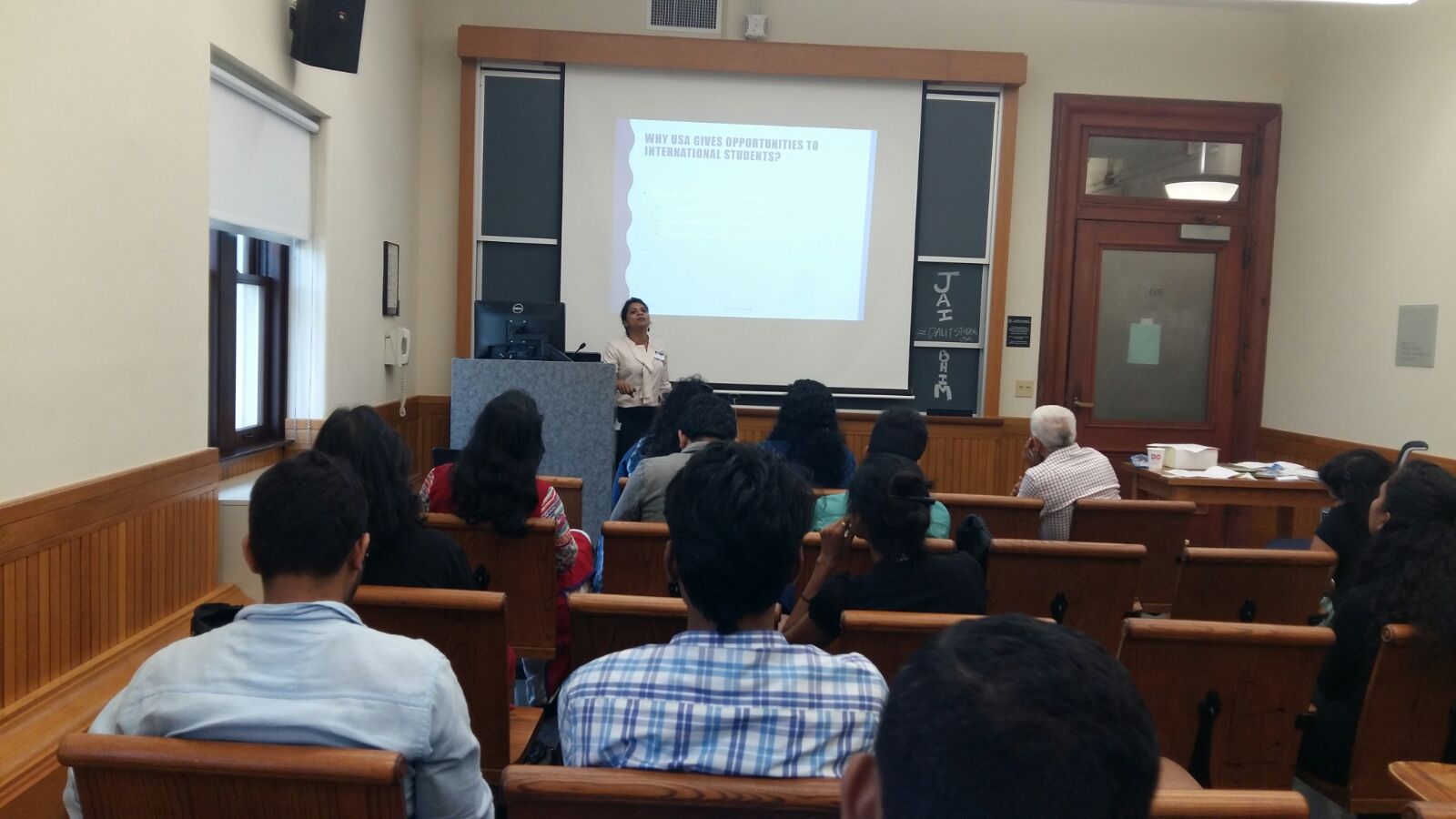
10th September, 2016
Students Workshop
One day Students’ workshop was organized for new students with Ambedkar International Mission, USA (AIM) group at Columbia university, NY on 10th September, 2016. This workshop covered various topics from academics to pay back to society mission. Academic and professional experiences were shared by graduated students and professionals respectively to make aware new students about US culture.
